



AUTUMN 2023 The magazine for members of the PHA UK www.phauk.org Plan ahead to protect your health GETTING READY FOR COLDER WEATHER Expert advice, real experiences, research news, and more… Also inside... Help us put the spotlight on pulmonary hypertension PH DAY UK IS BACK!
humans & hounds helping Annie prepare for transplant PEOPLE
The
& PET POWER















You'll also find plenty of real experiences from people affected by PH, and I’d like to take this opportunity to sincerely thank everyone who trusts us to share their stories. We know how much it helps to read about how others navigate their journeys with pulmonary hypertension.
Over the summer, we spoke to seven people on camera about their stories of waiting too long for a diagnosis. They are part of a special film we are producing for PH Day UK, which takes place this year on Friday 3rd November. (Turn to page 10 to find out how to get involved in our awareness-raising activity).

We’re sharing these experiences to bring to life the findings of our major survey into what it’s like to live with PH today. Over 850 of you completed our questionnaire, and we’ll be publishing the full results - including news of
how long people are still waiting to be diagnosed with PH - later in the year.
Finally, I would encourage you to pay close attention to the advice shared by Consultant Pharmacist Neil Hamilton on page 33. As we move into the colder months, he explains the importance of planning ahead to guard against seasonal viruses – ensuring we all stay as well as possible in autumn and winter.

Look after yourselves, and each other.
WE KNOW HOW MUCH IT HELPS TO READ ABOUT HOW OTHERS NAVIGATE THEIR JOURNEYS WITH PULMONARY HYPERTENSION
Iain Armstrong Chair of the PHA UK media@phauk.org
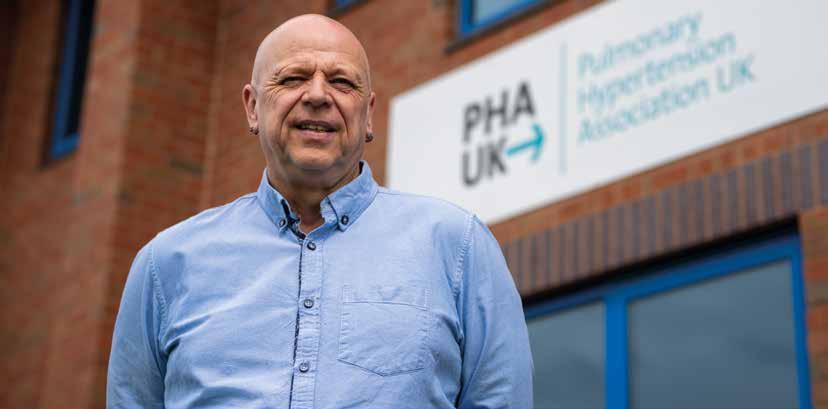
It’s my pleasure to welcome you to the autumn issue of Emphasis, which is full of features and expert advice.
Hello www.phauk.org #WhyAreWeStillWaiting PH 2023 DAY UK IT TOOK ME TOO LONG TO BE DIAGNOSED WITH PH #MoreThanMyPH #PHDayUKPH 2023 DAY UK I’MMORETHAN MYPULMONARY HYPERTENSION www.phauk.org FREE PH Day UK photo card with this issue! AUTUMN 2023 emphasis 3
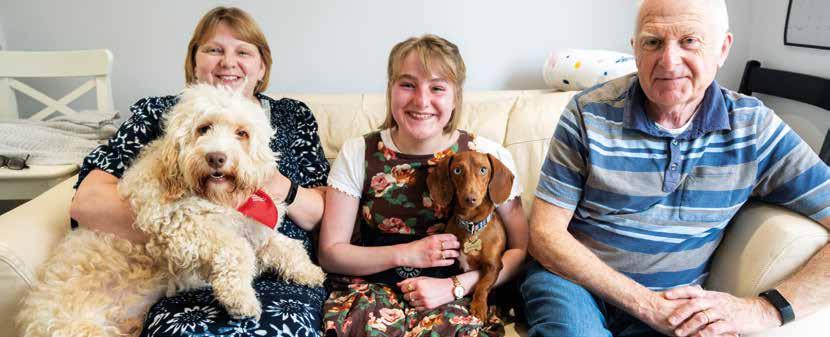



22 Treading the PH path together Partners Kelly and Chris tell us about their journey 44 Staying positive through the tough times Jane Machell on how she’s found ways to keep smiling 54 My first year of secondary school with PH Emily looks back on her experiences 61 Getting back to my ‘happy place’ in the water The difference a drysuit has made for Katie WHAT’S INSIDE? AUTUMN 2023 This magazine is printed on paper from sustainably managed sources Emphasis magazine is produced by the PHA UK. This magazine is intended only to provide information and not medical advice on individual health matters. The PHA UK will not be responsible for readers’ actions taken as a result of their interpretation of this magazine. We encourage readers to always discuss their health with their doctors and medical team. Registered Charity Number: 1120756. © PHA UK.
gives me the opportunity of a new life” How to get involved in our annual awareness campaign ASK THE SUPPORT NURSES Your PH questions answered PH DAY UK IS BACK! PH 2023 DAY UK The people and pets helping Annie while she waits for the call LIVING WITH PH 10 19 15
“Transplant




06 Upfront News, musings and more 27 Meet the member Say hello to Andrea Bown 41 Fundraising Focus How you've been supporting us 46 Food for thought Expert advice on nutrition and PH 25 Dangly donations The earrings making money for the PHA UK 30 Celebrating Sarah Suzanne Calder on her daughter’s life with PH 50 It’s time to talk about treprostinil The drug that could be making a comeback in England and Wales 58 Advancing rare disease research and improving patient outcomes Putting the spotlight on genetic research in PAH Get in touch: PHA UK Resource Centre, Unit 1, Newton Business Centre, Newton Chambers Road, Thorncliffe Park, Chapeltown, Sheffield, S35 2PH office@phauk.org 0300 373 5367 @PULHAUK @PHA_UK @pha_uk_insta @pha_uk No part of this magazine may be reproduced without the prior permission of the PHA UK. The motivation behind Tyler’s fundraising cage fight Fighting
my mum Taking pride in self-discovery Columnist Raya on how she’s learned about who she is ENJOYING LIFE WITH PH These little phighters know how to have fun 38 53 29 REGULAR FEATURES THE BEST OF THE REST
for
UPFRONT
News, musings and more...
More medals for Catherine
PHA UK member Catherine Makin was all smiles after winning three bronze medals at The British Transplant Games in Coventry this summer. Catherine had a double lung transplant in January 2020, five years after being diagnosed with PH, and swimming is now an important part of her wellbeing.
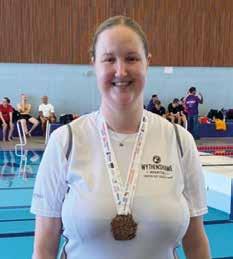
Every step for Maho
Maho Yokoyama had been planning to write about her life and PH, and to take on a PHA UK fundraiser with her friend Heena Jagatia. But she never got the chance, passing away whilst on the waiting list for a heart and lung transplant. Instead, Heena completed their planned challenge on her own – running 5km every day of July to raise almost £1,000 for our charity. Every step of the 93 miles was for Maho, who is pictured at her PhD graduation ceremony when she was well.

We’re supporting Organ Donation Week to help spark conversations, and you can find out more on page 14 .
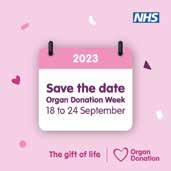
Paw prints and PH
PHA UK Chair Dr Iain Armstrong has won two accolades in the 2023 Guide Dogs UK Volunteer Awards.

Alongside his clinical and PHA UK work, Iain looks after guide dogs whilst they are in training, caring for them at home until they are ready to be paired with someone who needs help.
Iain has been playing this important role alongside his PH work for 19 years, and these awards recognise his commitment and his care. He is pictured below with his certificates, and with one of his charges, Lenny.

AUTUMN 2023 emphasis 6
Sharing stories and raising awareness
Ever since her husband Bobby died from PH, Bunty Cloy has been determined to finish the story he had started writing about his life. She has now had "Did I tell ye" published for friends and family, and a shop in her hometown of Wigtown in Scotland is selling copies to raise money for our charity. We’ve provided posters and leaflets to help shop visitors find out more about PH in Bobby's memory.
Welcoming Sian
We’re delighted to welcome Sian Richardson, a former Clinical Nurse Specialist in PH, to the PHA UK team. Sian has joined our charity as a PHA UK Support Nurse and is working one day a week, following retirement from the NHS.

Sian is passionate about helping people live well with pulmonary hypertension, and outside of work she enjoys time with family, dog walking, and evenings with friends.
Love and a Land Rover
It's our pleasure to share this photo from a very special wedding that took place over the summer.
Alice and Ollie Charles gave every guest a PHA UK pin badge, in memory of Alice’s brother Josh Parker, who died at the age of just 21.

Keeping the faith
These are the words of PHA UK member Julie Royle, who was on cloud nine after watching her beloved Manchester City FC win the treble in Turkey over the summer. Julie was diagnosed with PH back in 2012, and she gets to matches with her son Alex whenever she can. The pair travelled together to the game in Istanbul to watch their club take the title.

He never managed to finish rebuilding his beloved Land Rover, but the family got it up and running to take a starring role in some of the photos.

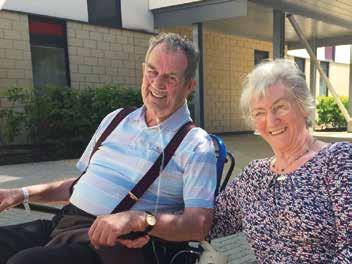
AUTUMN 2023 emphasis 7 More UPFRONT
"Dreams do come true, and you should follow them whenever you can – even with PH"
UPFRONT
News, musings and more...







If you attend the specialist centre at the Royal Hallamshire Hospital (or are cared for by their team elsewhere), we’d love you to join us for our collaborative ‘Together’ gathering.
Taking place at the Quays Hotel in Sheffield on Saturday 21st October, this is a special opportunity to meet other people living with PH and enjoy a day of educational talks, delicious food, and more.
The event is completely free, and tickets are limited to two per person, meaning you can bring a family member or friend along if you wish.
This is the first in a series of events that will be held in partnership with specialist centres around the UK, so keep an eye out for news of a Together event near you soon.
Words of wisdom
The people who understand pulmonary hypertension best are those who live with it themselves, and in our new leaflet, PHA UK members share their words of wisdom to help others adjust to a diagnosis.

This eye-catching resource will be sent to all new members joining the PHA UK. It’s also available free to anyone who would like a copy at www.bit.ly/Words_Of_Wisdom.
“Trynotto assumetheworst,there aresomanywaysthat youcanbehelped.”
Judith
positives“Tryandseetheineveryday andtrynottoletyour diagnosisweightoo
“Embrace
“We’re all different with different needs, boundaries, and circumstances, and one person’s experience won’t automatically be yours. Lean into others for support and understanding but live your own journey.” Jo
strong.“KeepgoingandstayNodayisthesame –soifyouhaveabadday, betterdayswillfollow.”
Lauren
AUTUMN 2023 emphasis 8
the life changes you will need to make and remember life is not over.”
Myra
Wordsof wisdom
Our private Facebook groups are a valuable source of support and advice from people who truly understand. Each group has a strict screening process to ensure those requesting to join are genuine, so you can be confident of privacy. They are safe spaces to talk to other people with similar lived experiences. PHA UK Official Facebook group A very active forum, with almost 2,500 members. Join at www.bit.ly/OfficialPHAUKFacebookGroup PH Parents UK This group has been set up independently of the PHA UK and is run by a collection of parents and guardians. Join at PHA UK Official Carers Group This forum is exclusively for family members, loved ones, and anyone who provides care or support for someone with pulmonary hypertension. Join at There are people [with PH] “Read everything your hospital gives you.” Chris “To me, being a ‘phighter’ means having the strength to find every opportunity to live my life to the full, in spite of my physical restrictions.” Jane www.phauk.org Connect with others online “Try not to be scared. The specialist team caring for you are amazing, and mine have been looking after me for 19 years now.” Christopher “Keep going and stay strong. No day is the same – so if you have a bad day, better days will follow.” Lauren “Listen to your own body. Nobody knows it better then you and it will tell you when something is wrong.” Paula “Communication isabigthing.Talkto someoneyoulove.” Lou Words wisdomof Advice from people living with hypertensionpulmonary Hear from the experts by lived experience NEW LEAFLET!
Order your tickets now by scanning this code or visiting www.bit.ly/TogetherSheffield LAST TICKETSFEW AVAILABLE!
Will you be joining us in Sheffield?
Your letters
> Dear PHA UK...
Dear PHA UK,
This is my son James who was diagnosed with PAH at 17. He does not let it define who he is and despite all the medication he takes, he has completed his first year HNC at drama school and loves music and theatre. He’s proof that you can still fulfil your dreams and live life to the full with this diagnosis, even at such a young age.
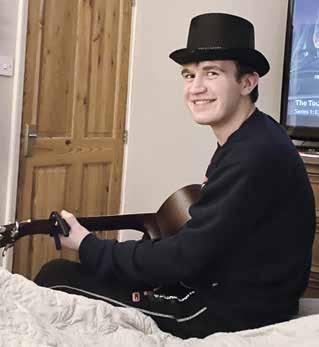 Lynsey Francis
Lynsey Francis
Hi PHA UK,
I was officially diagnosed with CTEPH in November last year. Struggling with the diagnosis and not wanting to worry others, I told select friends but not my family.
Your charity helped me through coming to terms with the condition and options. In January I was invited to Royal Papworth to discuss the pulmonary endarterectomy surgery. I told my family the night before and took my brothers with me where the operation was explained.
Got
My operation was on 24th May and I'm already seeing the benefits. Throughout the process, the posts across all your social media accounts were what got me through and kept my spirits up.
I've pledged to do some fundraising in January next year once my recovery is complete, and I'll keep you posted about that, but I just wanted to give you some feedback on how you helped me get through this very difficult time.
Furkan Jussab
AUTUMN 2023 emphasis 9
something
Email us at media@phauk.org or write to PHA UK Resource Centre, Unit 1, Newton Business Centre, Thorncliffe Park, Sheffield S35 2PH. You could see your words published in the next issue of this magazine!
to say?
PH Day UK is back!

Raising awareness of PH is an all-year-round activity, but we’re turning up the volume on Friday 3rd November.
The theme of this year’s campaign is #WhyAreWeStillWaiting, after PHA UK research has shown that too many people still wait far too long to get their pulmonary hypertension diagnosis. The full findings will be released on PH Day UK, highlighting that in the last 15 years, and despite huge advances in treatment, there has been little progress in wait times.
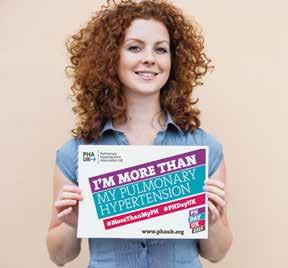
We’ve spent the summer making a series of short films to tell the personal stories of some of those who have dealt with the consequences of the delays. Annie, Kristy, Mel, Tom, Carole, Sarah and Chris all had different but frustrating waits, and we’ll be sharing their experiences as part of our campaign. You’ll find ways of sharing your own, and getting involved in PH Day UK in other ways, here…
WILL YOU JOIN US?
Add voicesyouronline
Social media is one of the most effective ways of drawing attention to PH.
You’ll have found a photo card inserted with this magazine, which you can use to tell your story. If you waited a long time to be diagnosed, write in how long, snap a selfie, and share with the hashtags
#WhyAreWeStillWaiting and #PHDayUK.

Another option is to use the other side of the card to tell people who you are – showing that having PH does not need to define us.
If you don’t have PH, or you just want to show your support, you can download and print a third version at www.bit.ly/PHDAYUK.
Here you’ll also find downloadable graphics that you can use to spread the word online on 3rd November.
For more ideas, visit our PH Day UK online hub at www.bit.ly/PHDAYUK or scan this code



Find out more about pulmonary hypertension www.phauk.orgat #PHDayUK PH 2023 DAY UK I’M SUPPORTING PH DAY UK
AUTUMN 2023 emphasis 10 www.phauk.org #WhyAreWeStillWaiting PH 2023 DAY UK ITTOOKME TOOLONGTO BEDIAGNOSED WITHPH #MoreThanMyPH #PHDayUK PH 2023 DAY UK I’M MORE THAN MY PULMONARY HYPERTENSION www.phauk.org
Stac97320
I’m Stacey and I’m a foster mum, a sister, a friend, a cook, and a handbag addict. I’m more than my PH.
Join our Walk for Hope
Walk or wheel with us on Friday 3rd November and let’s look towards a brighter future for people with PH. Choose your distance, and stride out knowing that others from our special PH community are walking alongside you. This isn’t about big numbers; 50 metres up and down your living room is just as impressive as 10 miles up and down hills in the rain. You can also take part in a wheelchair or on a scooter. We’re all different, and we’re all in this together.
There is no obligation to turn your walk into a fundraiser, but if you do decide to raise money for the PHA UK, we’ll be grateful for every penny. Wear our free sticker and dedicate the distance to someone you love. Order yours now, find out more, and register for the walk, at www.bit.ly/PHAWalkForHope
Organise your own event or challenge


Walk for Hope
forGreatlittle phighters too! NEW!
PH 2023 DAY UK
If you want to raise funds as well as awareness, but walking isn’t for you, why not choose your own challenge or event? Here are some ideas that don’t involve exercise:
> A dress down day at work (or non-uniform day at school!)
> A bake sale
> Quiz nights – online or in-person. You’ll find a fab quiz written by PHA UK member Rob at www.bit.ly/Robs_Quiz
> Head shaves or body waxes (for the braver amongst you!)
> Yard sale or car boot sale
Our free fundraising packs contain balloons, bunting, cake flags, and more. Order at www.bit.ly/PHAFundraisingKit
Contact your local media
Want to tell people what it’s like to live with pulmonary hypertension and why you’re supporting PH Day UK?
Your local newspaper, news website, adio station or TV news network will be happy to hear from you.





Send them an email or give them a call and tell them you’d like to talk. Please also pass on our email address: media@phauk.org in case they want some more information or an expert spokesperson.
Everything that you need in one handy pack
Our new awareness packs contain everything you need to shout about PH on 3rd November, including... Letters and leaflets to send to your GP surgery to help them understand more about PH.
PLUS, fact sheets, car stickers (that can also be used in house windows!), posters, social media templates and ideas ...and much more!
AUTUMN 2023 emphasis 11
Order now at www.bit.ly/PHDayAwarenessPack or scan this code >>> ?
Your data Your thoughts
Here at the PHA UK we firmly believe that all pulmonary hypertension research should put patients at the centre.
There may be times when researchers want to know how the patient community might feel about their clinical data (health records) being accessed as part of a study – without their written consent. With upcoming research projects that need the patient voice to guide their development, we conducted an important survey in June to capture opinions and ensure that voices are heard.
Research studies can be used to find out many different things, so our survey asked for people’s thoughts about their data being accessed in various circumstances.
The findings on the right will help inform future studies in the field of PH. Thank you to everyone who shared their thoughts and opinions.
A word of reassurance: All studies involving patients and their kinship must, importantly, gain approval from ethics committees. If the study seeks to access patient data, the ethics of this will be considered as part of this process. Researchers cannot access patient data ‘as and when they please’, so please be reassured it is safe.
We also asked the same questions of people whose loved ones have PH, as the opinions of carers matter too. You can see their responses by scanning this QR code or visiting www.bit.ly/DataThoughtsPH Our survey also asked for people’s comments, and you can read a selection of these here too.


AUTUMN 2023 emphasis 12
The findings
Sometimes researchers need to access patients' present data and historical data (which might be many years old) to help find ways of diagnosing PH earlier.
Sometimes researchers need to access patients' data to understand how effective a drug treatment is now, or has been historically. The aim may also be to investigate its side effects, or its efficacy over a longer period of time (such as 5-10 years).
of people with PH said they would be happy for their health records to be accessed, without written consent, for this purpose.
%
76 % 89
said they would be happy for this to happen following their death.
Sometimes researchers need to access patients' data to understand what treatments are taken at what point, and in what order. By mapping this against disease progression, it can help scientists identify the most effective treatment pathways.
%
of people with PH said they would be happy for their health records to be accessed, without written consent, for this purpose.
%
77 % 89
said they would be happy for this to happen following their death.
80 % 90 of people with PH said they would be happy for their health records to be accessed, without written consent, for this purpose. said they would be happy for this to happen following their death. AUTUMN 2023 emphasis 13





These people have all had their lives transformed by organ donation Right now, more than 7000 people are waiting for a transplant to change their lives. As an organ donor you could save up to nine lives and transform many more by also donating tissue. Add your name to the NHS Organ Donor Register, and let your family know what you’ve decided. Visit organdonation.nhs.uk Use the NHS App or call 0300 123 23 23 @nhsorgandonor
Yuri
Olivia
Hilaria
Max
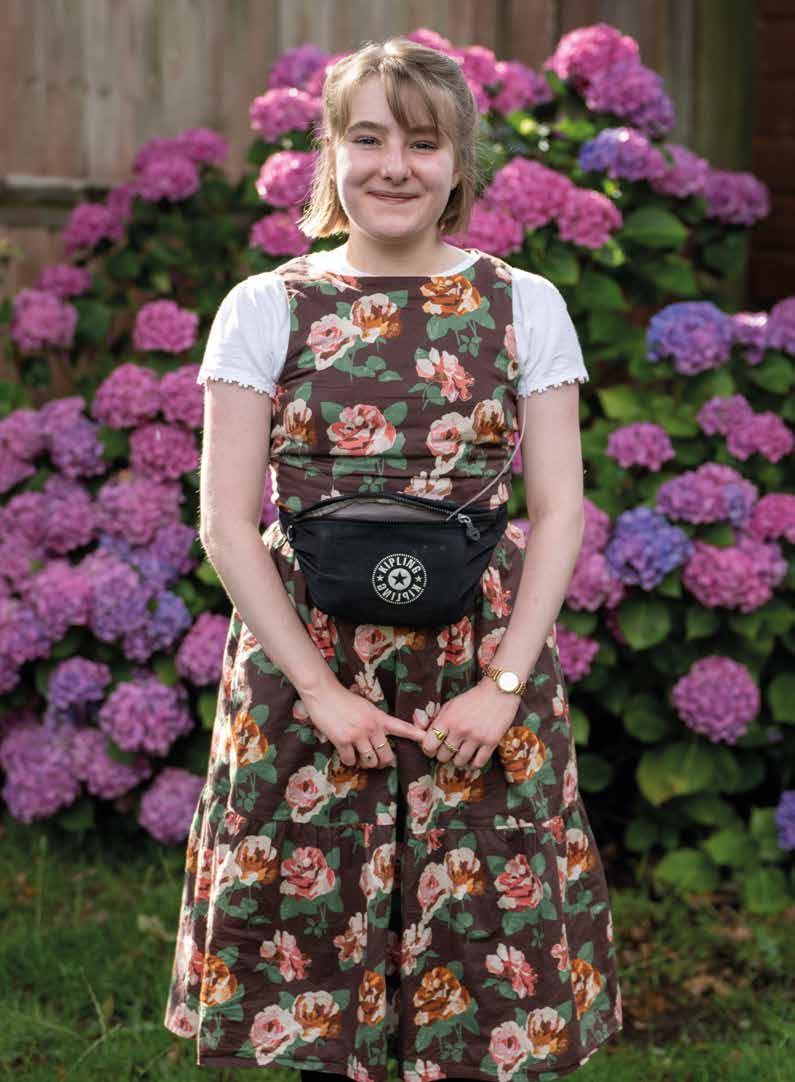
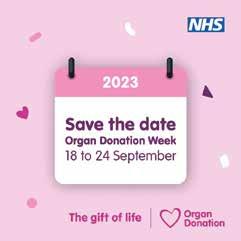
AUTUMN 2023 emphasis 15
“ Transplant gives me the opportunity of a new life ”
Luciana Pettitt (known as Annie) is 20 and lives in East Sussex. She was diagnosed with PH at the age of 15 and was placed on the waiting list for a double lung and heart transplant in February this year. We spoke to Luciana and her father Mike in June, to hear about the family’s experiences and the people and pets who are helping them.
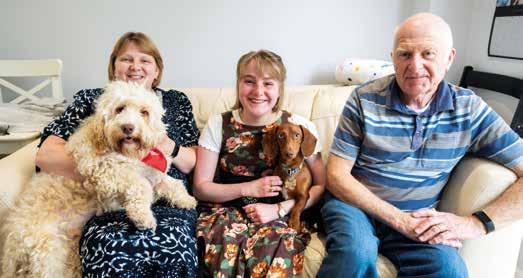
Luciana
Ihad been a relatively normal teenager but then I lost the ability to breathe and walk. I got ill so quickly, and there were a lot of A&E trips and a lot of GP and hospital appointments because no one believed there was anything wrong.
Because I was a teenager it was assumed that I just had anxiety, and that was difficult.
I had seven months of screaming and crying at people - doctors, my parents, my school - saying ‘there’s something wrong but I don’t know what its is’. No-one was listening to me because people aren’t inclined to listen to teenage girls who are ill.
I was so unwell that I got diagnosed at the Royal Brompton Hospital [specialist PH centre] within half an hour of being there. They said, ‘we cannot let you leave this hospital because if you continue living without medication, you will die and you will die soon’.
For me, getting the diagnosis was a huge relief because it meant that someone finally listened to me. But it was also terrifying to realise that this was not something that was going to go away, and I would have it for the rest of my life.
I was started on intravenous Epoprostenol immediately and it was a very big shock to my body, so I was extremely unwell. I had a lot of pain, I had
chronic migraines, and I was sick a lot.
At the time of diagnosis, there was talk of transplant in terms of ‘this is something that will happen in the future’. But I didn’t know anything about organ transplant. I didn’t know anything about IV medication, and I didn’t even know what PH was.
A few months after I was diagnosed, I was placed on the transplant list for the first time, because I was really unwell. Great Ormond Street Children’s Hospital, where I was being treated, were really good about it.
They had induction days for all of the 'transplant kids', where they showed us all of the equipment, operating rooms and recovery rooms, and we got to meet with the surgeons. I spent a week there, and they took me through everything I needed to know about lung transplant.
I was suspended from the list in September 2019, because I had started to improve, but at the beginning of this year doctors started talking about transplant again.
I had gone into heart failure in November 2022, and went onto a drug trial which didn’t help. I was extremely
AUTUMN 2023 emphasis 16
With mum Alison, dad Mike, and dogs Milo and Digby (our cover star!)
unwell, so I was placed on the list again in February of this year.
Knowing that the call could come at any time is stressful. But I’m more excited than anything, because transplant is a huge opportunity for health and for freedom.
My parents are my carers, but a transplant means I will be able to leave the house on my own. I will be able to swim, I will be able to walk, and I will be able to breathe properly and ride a bike.

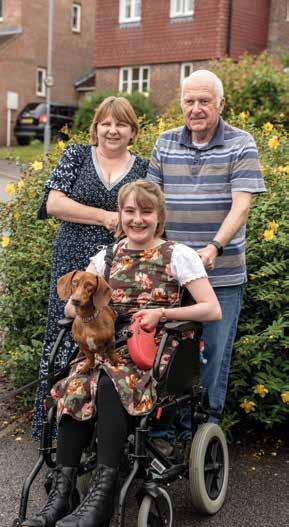
My independence and my ability to exist as a teenager was entirely stripped from me when I got ill, and there was nothing I could do about that. A very difficult thing to deal with has been mourning the loss of the person I was, and also the future that I don’t get to have.
But transplant is an opportunity for me to be as healthy as I can be, and to have a really good quality of life.
Everyone else that I know has moved on with their lives. All of my friends have just finished their first year of university and I’m still at home. I didn’t do my GCSEs; I didn’t do my A Levels. I haven’t been a full-time student since I was 14.
I can’t do much at all anymore. My days consist of waking up, taking my medicine, and showering (which I can do on my own, but it is difficult).
I have to take multiple naps during
The gift of life

the day because I get so tired, and I get a lot of pain as well. This has all got worse since I’ve become more unwell, and life is very exhausting right now. My wheelchair is really important because it means I can conserve my energy.
My life is spent at home with the dogs. We got Milo last summer and we got Digby at the beginning of this year. They’re both very good boys and they have made a world of difference to my wellbeing.
My friends are also incredible and always have been. They have stuck by me through this entire thing.
Spending time learning about PH gives me the freedom to be able to talk about my illness to medical professionals so that they can explain it to me, and I understand it.
The human body is fascinating, and I have always loved science and anatomy. I think being able to understand that makes it easier to cope because I can understand why my body does the things it does, and why my illness is there.
I can understand my symptoms, side effects and medicines because I have the medical knowledge to put context into the way I am feeling.
As a teenage girl, I’ve noticed a lot of ableism, because I am not what people’s definition of disabled is. But disability doesn’t look just one way.
I’ve been yelled at for using disabled access toilets, and people stare at me or make rude comments because I need a wheelchair.
I was once laughed at by a grown man at a train station because I had my ‘please offer me a seat’ badge. I was coming back home from a transplant appointment at the time.
I think it is really important for everyone to do their research on organ donation and why recipients need organs.

You hear about family members and friends who give kidneys to people they know, but what about strangers? It makes an unbelievable amount of difference.
Right now, my quality of life is low because I’m so unwell. I have reached the ceiling of care, so transplant is this huge thing. It is absolutely terrifying, but I am looking forward to it because it gives me the opportunity of a new life.
Mike's words AUTUMN 2023 emphasis 17
Knowing that the call could come at any time is stressful
Read
The whole process has been very hard because Luciana was clearly unwell before the diagnosis. But her vital signs were normal, and she did not ‘look’ ill. That’s a huge issue.
Of course, as her parents we felt guilty after her diagnosis because you think ‘was this something we all missed?’
When we were given the diagnosis, I remember asking the consultant whether it was life-threatening, life-changing or life-limiting. ‘All three’, he said.
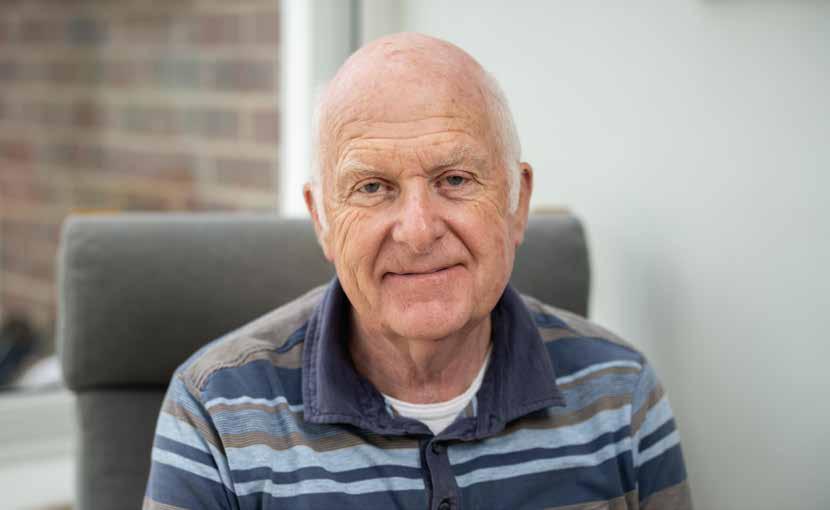
I understand that transplant is the only option for Luciana. There are risks, but this is our daughter who we love and cherish and always have done.
It’s such a huge undertaking, clinically and medically, but it is all to give her an extended period of life – of good quality.
Mike
Having conversations about organ donation is critical. We have been struck by the number of friends, and even neighbours, who have signed up to be organ donors since finding out about Luciana.
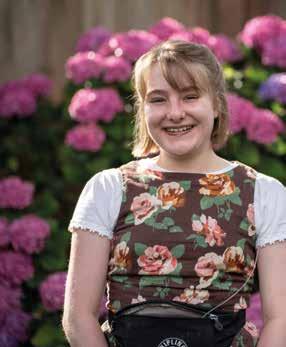
It’s an extremely difficult conversation to have with family members and friends but it’s a great gift to be able to give someone else the prospect of life.
We had a friend who was a police officer, who was sadly killed on duty, and his organs and tissue were used to help eight other people. That’s amazing.
The key point in all of this is that potential donors need to talk to members of their family about this because when the time comes, it must be very stressful, and they will be asked for their consent too. That’s why they need to understand someone’s wishes.
At the end of May in the UK, there were only 11 people in Luciana’s position on the waiting list. I think the key message here is please decide to donate, but please also tell the rest of your family that these are your wishes.
can find out more about organ donation at www.organdonation.nhs.uk AUTUMN 2023 emphasis 18
Having conversations about donationorgan is critical
You
NEW!
Support ASK THE nurses
PHA UK Support Nurses
Paul Sephton and Sian Richardson are former Clinical Nurse Specialists in PH, with long careers at the Sheffield Pulmonary Vascular Disease Unit. Still registered nurses, they now work part-time with our charity to offer support to our members.
Paul says...
The first thing you should do is check with your specialist centre that you are able to travel on a plane. Only then should you start your holiday plans.
You may need a ‘fitness to fly’ letter, and this will need to be issued by your specialist centre within 14 days of your flight. But please get in touch with them as soon as you know you’ll be flying, ideally at least six weeks beforehand. This is really important as it gives consultants time to prepare

the letter and send it out at the appropriate time. Even if you’re not normally on oxygen, you may need it to fly, especially if it’s a long-haul flight. This is all to do with cabin pressures, and your specialist centre will be able to advise on this too.
It’s important to remember that airlines will not allow you to take your own oxygen cylinders on board. If you own a portable oxygen concentrator, check with the airline to ensure they will allow your individual concentrator on the flight.
So, once you’ve been given the ok to fly by your specialist centre, it’s time to start doing some research. Continued...
AUTUMN 2023 emphasis 19
“I finally feel confident enough to go on holiday abroad, but I’ve no idea how to go about organising oxygen for a flight. Can you help?”
Preparation is key and although it may feel like a hassle, it’s worth making some calls.
First and foremost, when you make plans to fly, you need to ask the individual airlines whether they supply oxygen on the plane themselves or you need to hire the oxygen apparatus yourself – as this will help you decide who to go with and will affect the overall cost of your trip.

For example, a budget airline may list a cheap flight price, but you then may have to pay an additional £300 to a separate supplier for your oxygen. Whereas a more premium airline may include oxygen, so it may work out cheaper overall.
It’s worth bearing in mind that most airlines will have a limit on how many people can take oxygen on board, usually two or three. This is on a first come, first served basis, so again it’s important to call ahead and check the situation before you book your flight.
Don’t be afraid to make these calls. The airlines deal with this kind of thing all the time and they are so much better now at dealing with these enquiries than they used to be.
My top tip is that if you need assistance at the airport, for example to get around, speak to them about this when you call too.
If you need oxygen whilst you’re on holiday, as well as on the flight, this is something you need to organise yourself.
It’s worth contacting Pure O 2 (see page 2) for advice and a quote, and Baywater Healthcare have an information line on 0800 373 580. They also have very helpful information on their website at www.bit.ly/BaywaterAdvice
Remember to check with your accommodation that they are happy for you to have oxygen delivered there.
Many people on oxygen choose cruising over flying. But not all ships have piped oxygen, and cylinders present a risk because of storage. So even if you are planning to travel by sea, it’s important to do your research and check with the cruise company that they are able to accommodate your oxygen needs and requirements.
Sian says...
Your pump will be provided with two bags, supplied by the manufacturers, but there are plenty of other options that can help you feel comfortable when out and about.
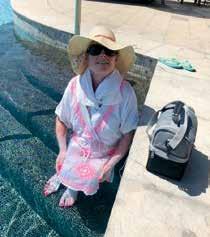
Choose a style that works for you and your body. You can get bags in all sorts of different sizes, from small ones that just fit the pump, to larger ones that will accommodate your purse
How you wear yours…

AUTUMN 2023 emphasis 20
Paul x
“I’ve been told I will need to start on IV epoprostenol soon and I don’t know what my options are in terms of how I can carry the pump. I’m a woman who likes fashion and I like to go out, what can I do?”
During her summer holiday to Crete, Andrea Bown stored her pump in a lunch bag from Decathlon during the day, keeping it cool when temperatures hit 40 degrees and allowing her to place it poolside whilst she took a dip up to her waist. In the evenings, she paired a simple cross-body bag with her dresses.
and make-up too. These are available in all sorts of different colours, and can range in price from £5 upwards, depending where you shop.
Make sure the bag is protective – for example with a zip that will keep the pump secure. And consider a strap that will feel comfortable on your shoulder (thicker ones tend to be best).
Some people like to make their own bags, or they buy them and customize them to suit their personality or their style. I’ve known patients who have covered bags with diamantes, to match glam evening outfits.
If you don’t want to have a bag on display, you can alter your clothes to allow a pump to be tucked away inside them, for example by adding a deep pocket to a dress.
Lots of people carry their pumps in bum bags, which sit around the waist and leave arms and shoulders free. If you’re self-conscious, these can be hidden under coats.
If you choose to find your own bag, my top tip is to then use the ones provided with your pump as your ‘shower bags’. They are not waterproof, but you could place them outside of the shower and you don’t need to worry about them getting a little splashed. Keep them in your bathroom and swap them over as you need to.
Or, you could keep one by your bedside and use that as your overnight bag, so you’re saving your ‘nice’ ones for the daytime.
You can embrace the pump and the bag and make it part of your style or hide it away if you’d prefer. There are plenty of options.
Don’t be afraid to explore different ways of carrying your pump until you find what works for you.
2. Sally Parker’s son Josh used a running belt from Spibelt (spibelt.co.uk). She told us they do a large single pocket size which fitted his Epo pump and was very discrete under clothing. He carried his spare pump in a neoprene pencil case.



6. Katie Eaton told us she uses all sorts of different bags, including the one pictured, to enable her to shower whilst travelling. She recommends running belts if you want to keep the pump really secure, for example at work or during exercise. Katie also has this great tip: “ The best thing I’ve got (but they don’t work for everything) are some cycling shorts. I had a seamstress sew in extra pockets in each side and I
put the pump in there and it’s invisible! It was great for a wedding when I wore a long dress, and it also works for baggier pants and skirts.”
4. Jennie Heineman told us she wears a StashBand (www.stashbandz.com) to wear her pump close to her body, meaning she doesn’t have to carry a bag.

Got a question for Sian or Paul? Email media@phauk.org and you could see it answered in the next issue. They are happy to answer your questions privately too, via our e-support service. Email support@phauk.org if you need help or advice from the team.

If
Want to recommend a bag or tell us how you carry your pump? Email media@phauk.org and we’ll share it with our members.

Sian x
3. Danielle Jones wears hers in a bum bag.
5. Jo Chapman has a CADD Solis pump and mainly uses the High Coast Hip Pack from Fjallraven.
she’s going out in the evening, she’ll swap to a disco bag from DiskoKids.
AUTUMN 2023 emphasis 21
Treading the PH path
together
Kelly Clarke was diagnosed with pulmonary hypertension last year, and she and partner Chris Wiltshire have navigated the journey alongside each other. We spoke to the pair, who live in Kent and have been together 15 years, to hear about their experiences.

K“I had symptoms for a good couple of years. Doctors thought it was asthma and we went through a long process of changing different inhalers, using steroids, and nothing really improving. I was progressively noticing that I was unable to do things without getting stupidly out of breath and really tired. I couldn’t walk up the stairs, and I felt like a 90-year-old.”
C“It was quite frustrating that we couldn’t pinpoint what it was. Kelly just wasn’t herself. It was hard for the kids as well because it did stop us doing things. Every time we went out, I thought she was going to pass out. It was really hard. I was looking up the symptoms on Google, wondering if it was lung cancer, or whether there were other things seriously wrong that doctors weren't picking up on.
K“I’m a medical secretary and I work in a GP surgery, so one day, when I was feeling particularly unwell, I asked one of the doctors to check my oxygen levels. It was pot luck that she had heard of PH, because she knew someone else with it. So, after seeing my oxygen results, she decided to do an echocardiogram (ECG) on me there and then. The readings were so abnormal that she sent me straight to my local hospital. I was there having tests for ten days, and
was then transferred to the Royal Brompton, where I had more tests before being given my diagnosis in October 2022. It’s weird, it was such a relief to get a proper diagnosis, but it wasn’t the answer that I wanted. It was very bittersweet.”
C"The PH team at the Brompton were great and they were happy to talk to me as well as Kelly. I did call the nurses a couple of times for a chat, and I felt better every time I spoke to them. But it was a real roller coaster at that time, and it was very hard for us both.”
K “The treatment has made a huge difference and I’m like a different person now. I’m on sildenafil and it is great entertainment knowing that it is also Viagra! I’m also on ambrisentan, and I’ve just recently started on Selexipag. I have so much more energy and get-up-and-go. I can go out and walk now, even though I still struggle with hills, and I find my body recovers quicker. It has made me want to do more things because before I couldn’t be bothered to do anything as I felt tired and was embarrassed of how I would look to other people. The treatment has been a game-changer really and I’m still able to work three days a week. My employers have been so understanding and flexible.”
In conversation...
AUTUMN 2023 emphasis 22
C“My employers have been superb through all of this too. While Kelly was in hospital, they offered family support days, so I didn’t have to take holidays. And I have health insurance through work, so I’ve been able to access counselling, which has really helped through this time. As my partner, it’s open to Kelly too if she wants it.”
K“Going through the last year has put a lot of things into perspective for us. It’s made us realise that there’s no point worrying about small things, and the focus should be on getting more enjoyment from life. We do so much more now.”
C“That’s definitely a positive that has come from all of this. I think we have a lot of appreciation for each other too, and we’re better at accepting help from others. Our family and friends have been amazing.”
Walking as one to raise funds and awareness

Earlier this year, Chris led a team of 60 colleagues on a half marathon walk around London, raising over £1,634 for our charity and helping people understand more about PH too.
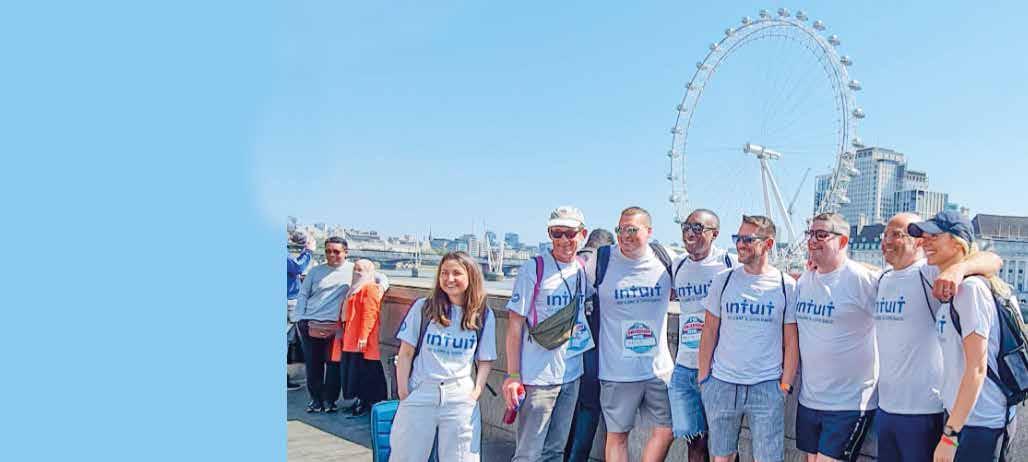
The group from Intuit Quickbooks, where Chirs works as a payroll compliance analyst, trekked around the capital wearing PHA UK wristbands and signs pinned to their tops to show they were walking for Kelly.

They enjoyed a breakfast together before embarking on the challenge, where PHA UK videos were shown to enable staff to learn more about the condition.

K“Looking back on the last year, my advice to anyone recently diagnosed with PH is to trust your specialist team. I’ve got full trust in them, and I’ve made good use of all the PHA UK resources out there too. Do not use Google, just concentrate on the information PHA UK gives you because it’s spot on, and very informative.”
C“My message for partners and relatives would be to use the help that’s available. When we found out only 8,000 people are diagnosed with PH, we wondered whether there would be much of it out there. But the support, from the Royal Brompton and the PHA UK, has been unreal. You are not alone.”
Kelly joined the group when they set off, and again at the end, and she said it was a memorable experience for all.
She added: “People I had never even met before came straight up to me and were so lovely. Everyone has just been so generous. Seeing people with my name on their tops was quite emotional. The online fundraising page was sent round to family, friends, and even my son’s football team, so it’s definitely spread a lot of awareness about PH too.”
Chris and his colleagues have also been supporting our charity throughout the year via their We Care and Give Back internal benevity tool, which has separately raised £1,1760. Both totals have been matched by Intuit, resulting in an incredible donation to us of £5,580

AUTUMN 2023 emphasis 23
With children Fred and Scarlett
Don't
miss out
on what's yours
As the cost of living continues to rise, find out what financial support you may be entitled to.
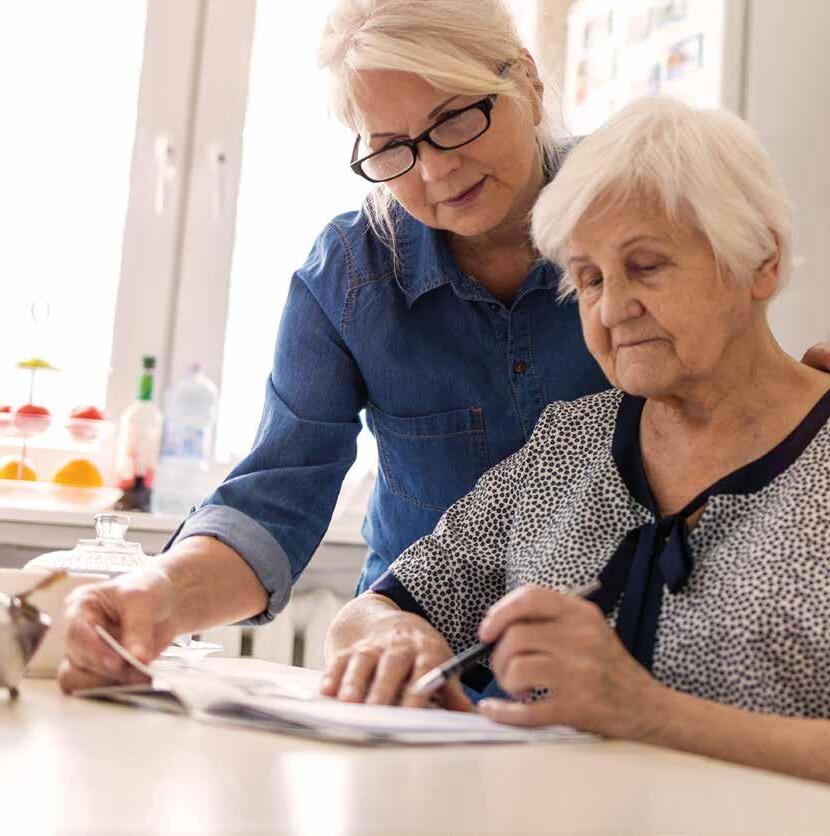
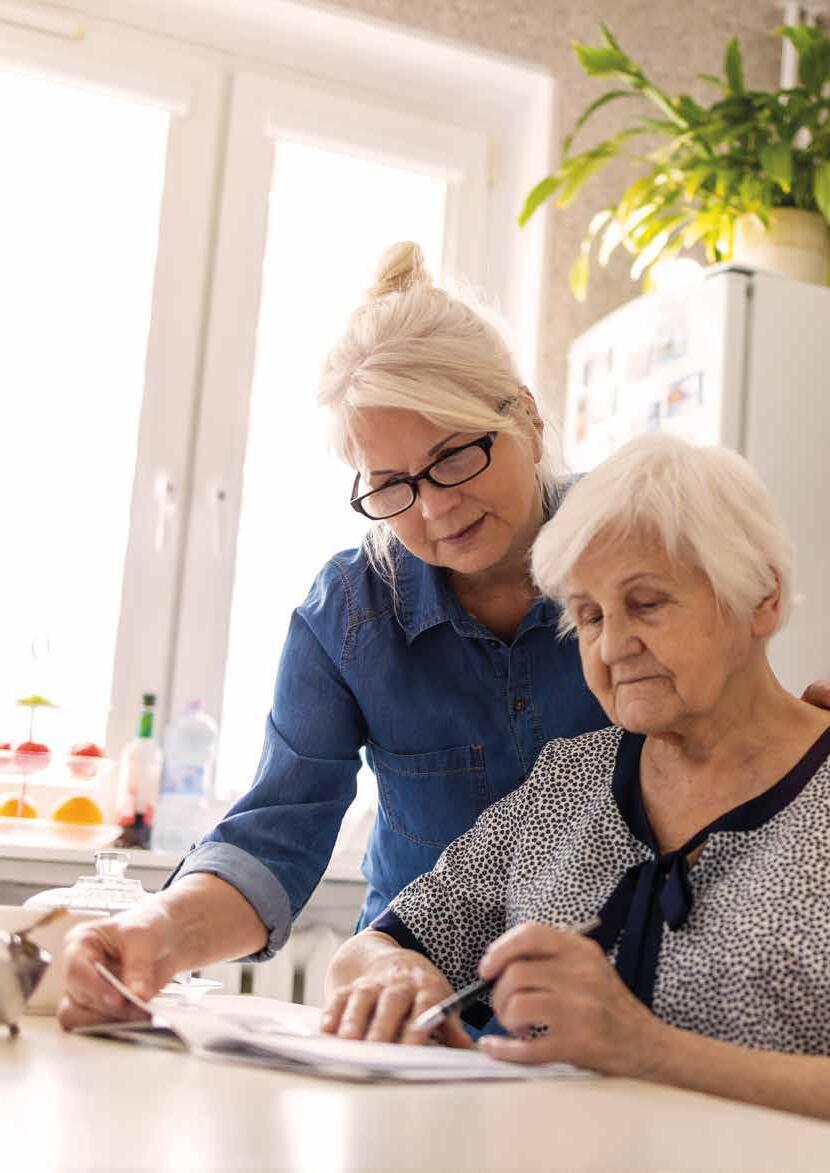
Calculator and Grants
tools now available at www.phauk.org
out if you could access welfare benefits, charitable grants and other support that
missing
In association with Turn2Us www.turn2us.org.uk
Benefits
Search
Find
you might be
out on.
Dangly donations
Tracey, who was diagnosed with chronic thromboembolic pulmonary hypertension (CTEPH) in 2012, has always done her best to support our charity.

She regularly asks for donations via Facebook for her birthday and takes on sponsored walks during our annual awareness campaigns. But when she spotted some handmade earrings in a local farm shop, it sparked the idea to make a range of her own and sell them all year round to raise money for the PHA UK.


Tracey has since set up a dedicated website, and has manned a stall at an event in her town.
Her 24 unique designs range from animals and insects to hearts and flowers, and there are even food and drink-themed creations – including ice lollies and carrots.
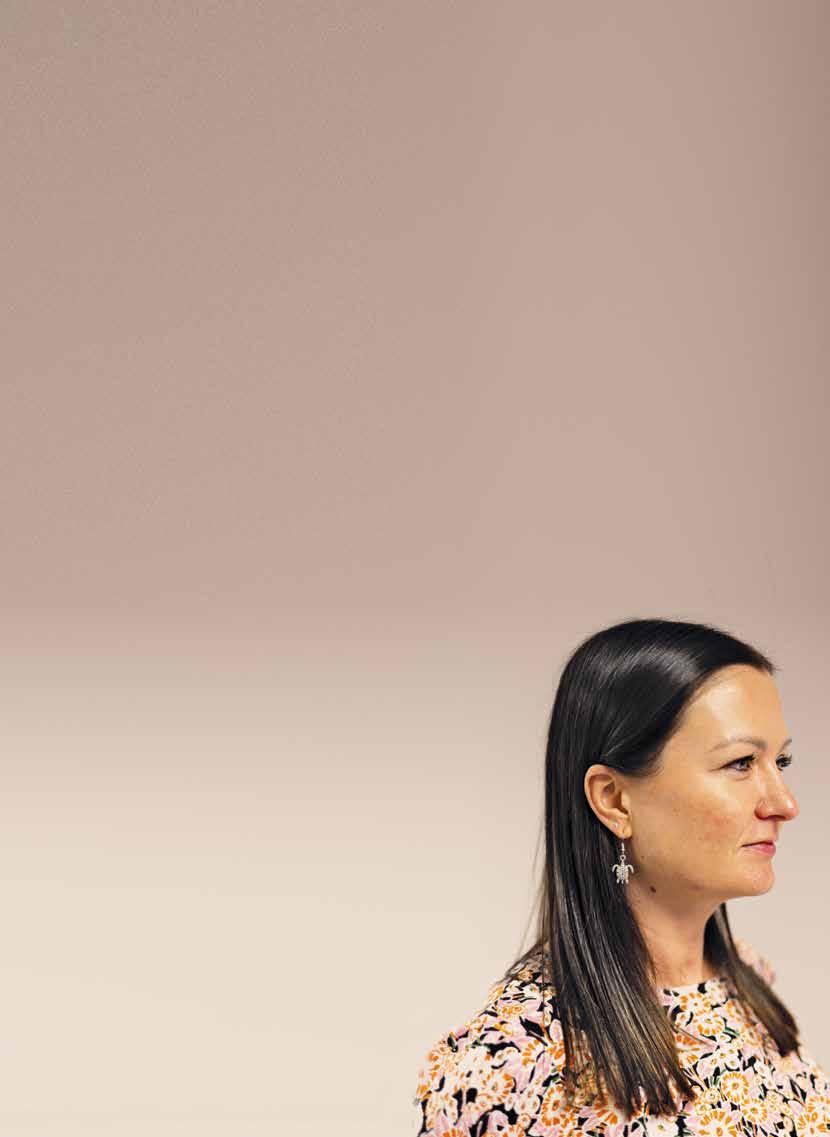
Tracey’s personal favourites are the bumble bees and turtles, and she is in the process of developing new seasonal designs for Halloween and Christmas.
“The earring designs that I have reflect what I like and the sort of earrings that I would wear myself”, she said. “It involves a lot of searching for the charms that I think will work and that hopefully appeal to others as well.”
Tracey started selling her jewellery in June, pricing her earrings at £2 per pair. In less than a month, she was able to make her first donation of £50 to the PHA UK – something she describes as ‘absolutely thrilling’. £250 has been raised so far.
“I began by creating a dedicated Facebook page, invited my friends to follow it, and then my partner Chris helped me to set up a website. This was a major step for me. My friends and family have been really supportive of what I’m doing.”
As well as selling online, Tracey also displays her earrings at a parent and toddler group she runs at her local church. They are accompanied by a poster about PH, and she uses this as a way of starting conversations to help raise awareness of the condition.
When it comes to fundraising ideas, PHA UK member Tracey Smith is all ears….
AUTUMN 2023 emphasis 25
You’ll find Tracey’s range of earrings at www.phabulous.co.uk
Tracey
Tracey's turtle design is one of her favourite's
Self-help programme from the PHA UK
ARE YOU STRUGGLING WITH ANXIETY?
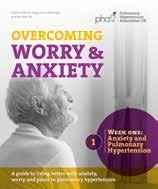

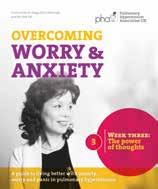



“When
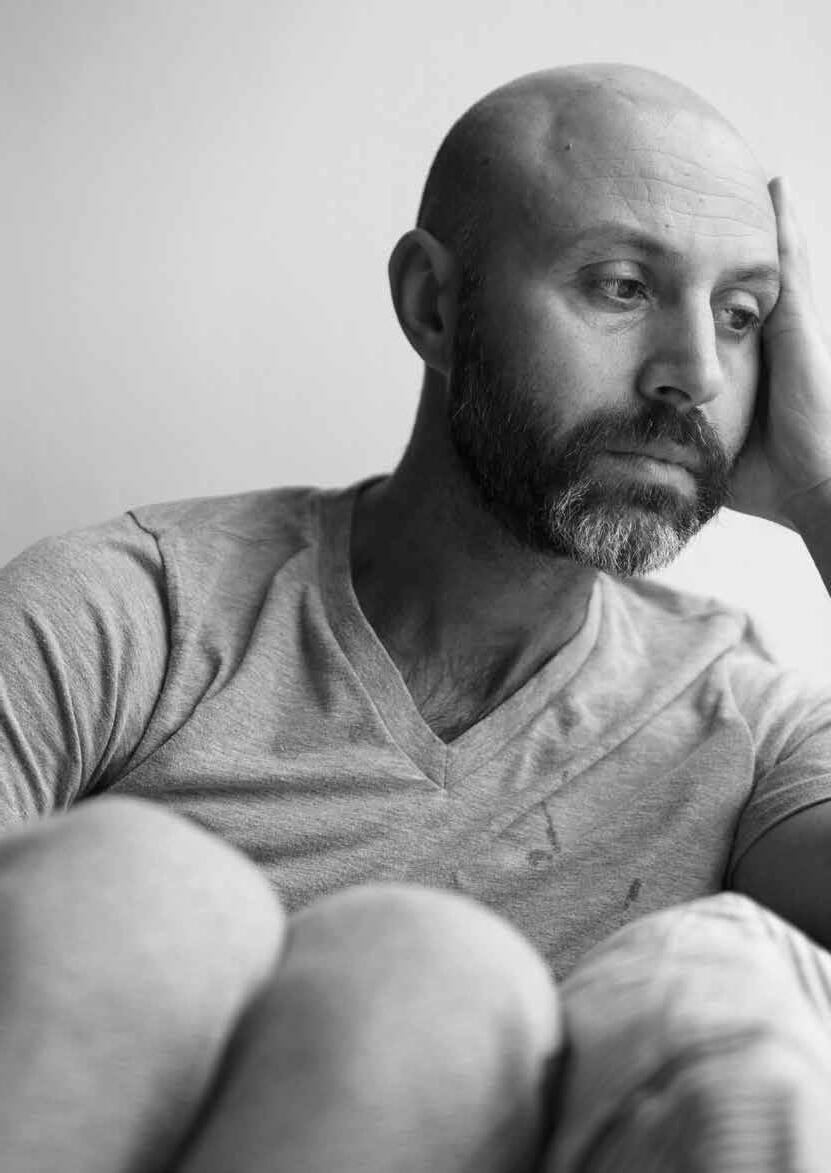
This four-week self-help programme consists of a series of workbooks based on Cognitive Behavioural Therapy (CBT), to
you
✓ Developed with
psychologists ✓ Tried and
Complete
at home
help
take control of problematic worry and anxiety.
a team of clinical
tested by people with PH ✓
in your own time
✓ Totally free of charge 100% of people with PH who tested the programme said it helped with their anxiety.
Request the programme at www.phauk.org or call 0300 373 5367
I received the booklets, I was determined to get the best out of them. I cannot express my gratitude enough. The clear explanations and easy-to-use strategies to cope with anxiety have been life-changing.” PHA UK member
Hi, Andrea! What does being a phighter mean to you?
time are the most precious thing we have.
Who is in your support network?
To me it means never giving up, always trying to keep positive, and seeing the good. Trying to live my best life within my limitations, but also realising on those days when I do feel like giving up, that better days are ahead. It means raising awareness and educating everyone, medics, nurses and people I meet in my everyday life. It means doing things I want to do now as tomorrow might not come. It means trying not to take things for granted. It means realising that people and
the satellite clinic at RUH Bath, who have kept me alive these 15 years. We all make one fabulous team!
What advice would you give someone newly diagnoised with PH?
I’m very lucky to have my fabulous and caring husband Rich and my furry boy, my cat Max! Rich is my rock, my everything. I also have my mum and dad-in-law and brother-in-law who are really supportive. My dad and brother are in the background too. I have some amazing friends in Jo, Manz, Cathy and Teena as well as my outstanding doctors, nurses, HCAs, technicians and all at the Royal Free and
Don’t Google! Join the PHA UK and be kind to yourself. It’s ok to feel overwhelmed (we all did at the start).
has lots of valid up-to-date information, and all the research they do. It makes me feel like I’m part of a community, rather than being on my own.
What's your favourite part of the magazine?
What's the best thing about being a PHA UK member? Knowing that they are there if you need them. Knowing that there is a supportive charity that

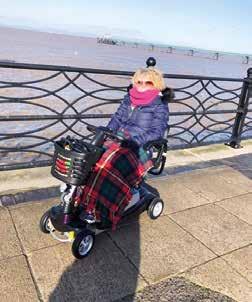
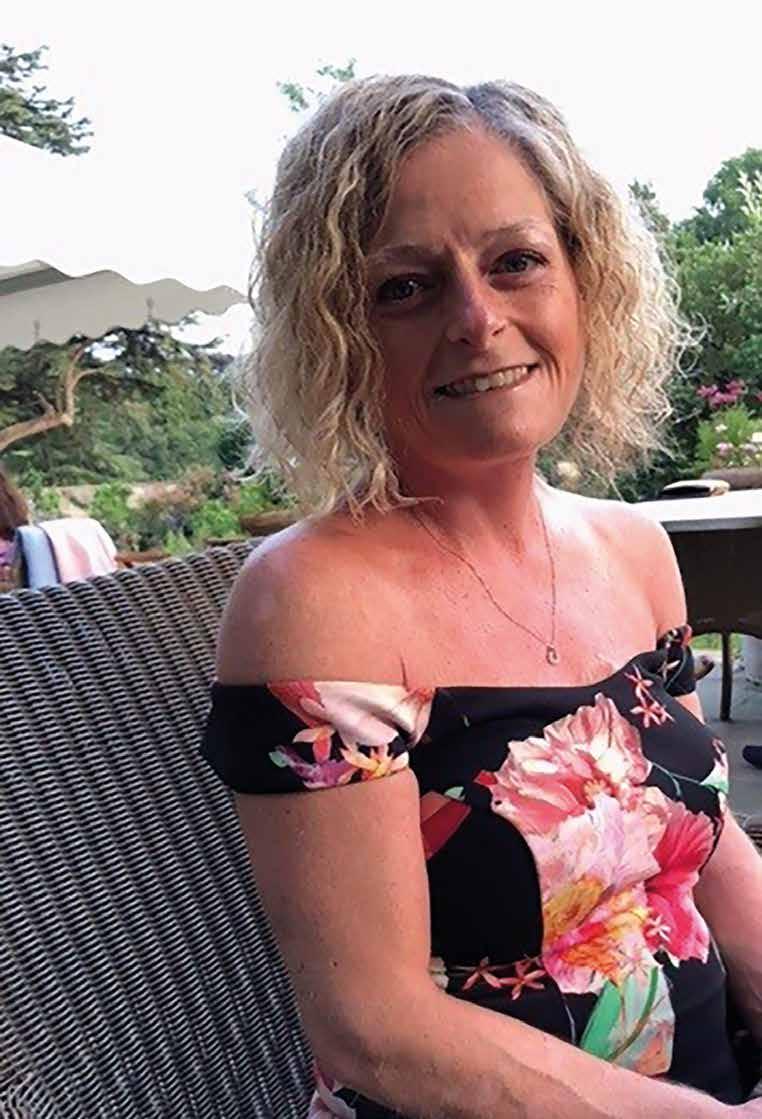
I love it when I hear that plop on the mat that tells me my Emphasis mag has arrived! I love the personal member stories and the tips and articles. I read my magazine from cover to cover; there’s nothing I don’t enjoy in it.
Want to see yourself in the next issue? Email media@phauk.org and we’ll send you over some questions!

AUTUMN 2023 emphasis 33
AUTUMN 2023 emphasis
Andrea Bown is 44 and lives in Bristol. She was diagnosed with PH 15 years ago and joined the PHA UK straight away.
Supporting people with PH and CHD
Here at the PHA UK we're working with a group of specialist doctors to help develop information materials for people with PH and congenital heart disease (CHD), and we need your help to guide their production.
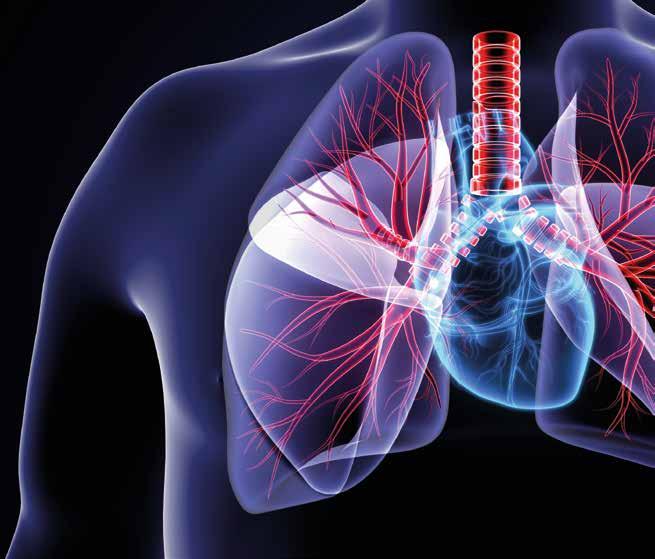
Before we start developing resources, it’s important that we understand what patients and their caregivers want to know, and where the support is needed.

If you have PH and CHD, please complete our survey at www.bit.ly/PHandCHD

If you are a caregiver for someone with PH and CHD, please complete our survey at www.bit.ly/PHandCHDcaregivers
How would you like to receive this magazine?
All members of the PHA UK automatically receive a printed copy of Emphasis through the post each time it's published. But if you’d prefer to receive your copy by email instead, it’s really easy to let us know!
Simply fill in our short form by visiting www.bit.ly/ConfirmYourDetails, or scanning the code on the right, and we’ll do the rest.


AUTUMN 2023 emphasis 28
This work is being carried out by the PHA UK in collaboration with the CHAMPION group, which is made up of clinicians specialising in the management of pulmonary hypertension and CHD, from a number of specialist centres in the UK. Their aim is to help improve the management of patients with PH due to CHD through research and education.
“I definitely got my fighting spirit from my mum”
Tyler Spencer had his mum firmly in his mind when he competed in a charity cage fighting event for us in July.


The 22-year-old from Derbyshire raised over £1000 in her memory, donning PHA UK-branded shorts and winning the competition after three rounds with his opponent.
Louise Dawn Gould lost her life when Tyler was just nine years old, and the Mixed Martial Arts (MMA, or ‘cage fighting’) event was the second fundraiser he has completed in her name.
“I definitely got my fighting spirit from my mum”, he told us. “She was very kind, very loving, but also feisty! She was a true phighter; a very strong woman, and very brave. All she wanted was more time with her children and I think she would have been proud of me for doing this.”
No stranger to the ring, Tyler took on a sponsored boxing match for us when he was 18 and he is determined to keep on raising awareness of PH alongside funds. He reached out to the huge MMA star ‘Paddy the Baddy’ on social media, to ask if he would support his cause in the run-up to the event in July. The celebrity shared Tyler’s fundraising page with his two-million Instagram followers and donated £100 towards his total.
Tyler’s employers Cemex also donated £200, and the rest was raised through family and friends – many of whom were there to cheer him on during the fight.
AUTUMN 2023 emphasis 29
Suzanne Calder’s daughter
Sarah was diagnosed with PH on her 25th birthday, and now 48, she continues to inspire her parents. Suzanne wrote to us to share her family’s experiences.
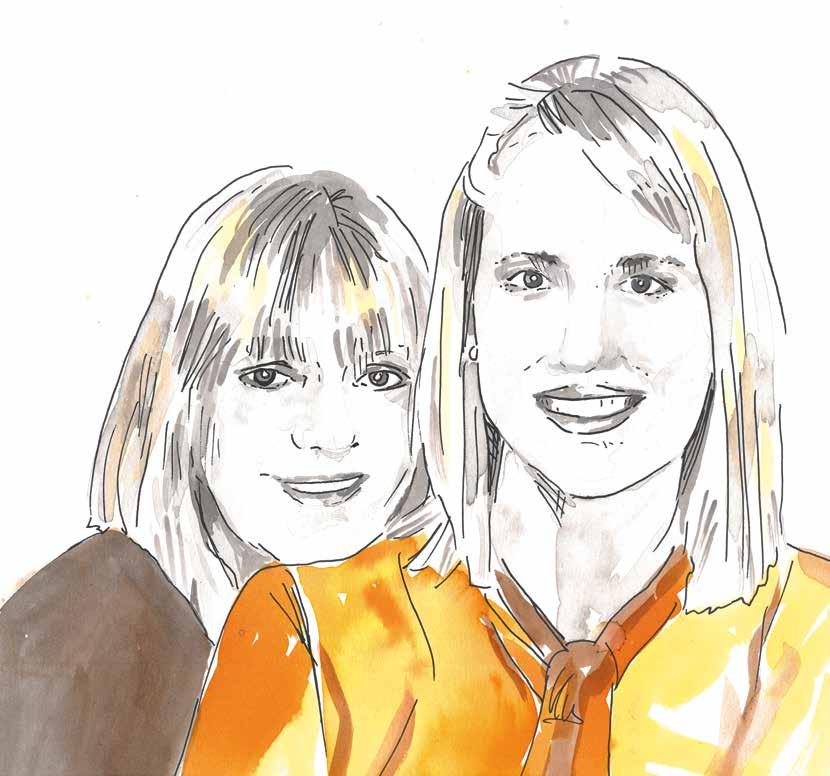
Celebrating Sarah
AUTUMN 2023 emphasis 30
Suzanne and Sarah
Dear PHA UK,
Where do I start? Our daughter was a beautiful baby with fair hair and blue eyes, which later changed to brown. As time went by, we took her for her first checkup with the doctor, and my husband John and I were told that she should see a heart specialist.
For a year, we had different appointments and they finally told us that it was a heart murmur, and not a hole in the heart as they first thought.
Sarah grew up and when she reached 18, we received a letter from the doctor saying that she needed another checkup for her heart murmur. Here she was told the right side of her heart was enlarged, but that there was nothing to worry about.
She saw a doctor and had to walk up a hill to get there. She was out of breath and coughing, and he noticed her lips and fingernails looked blue. After listening to her heart, he referred her to hospitals for tests and she was there for a week.
We all sat around the bed to hear the results of the final test. We were told that Sarah had a very rare illness called PH and that it was life threatening and there was no cure. The doctor also said she should not have children, and this was devastating news.
Grahaeme stayed with her in hospital and John and I drove home. That was the worst day of our lives.
Sarah was referred to Royal Papworth Hospital and they started her on medication taken via a nebuliser seven times a day – which was very tiring and time- consuming for her.
She had more tests and discovered that she did have a hole in her heart after all, but in a bizarre way, this was helping her PH, as it was easing the pressure.
As time went on, Sarah had to give up trying to work, but instead concentrated on her home, Grahaeme and her friends.
She had to give up lots of things as she adapted herself to a different life but decided not to let her illness dominate. She learned new things, like going to sewing classes, and writing and drawing.
but knows what she can do or can't do. Yes, life has dealt her badly, but she has picked herself up and is determined to live her life as well as she can.
We are thankful that she has such a loving husband and very good friends to help her.
I often wonder if this should have been looked at more, and what they might have discovered. But of course, in those days, I'm not sure if they even knew much about PH.
Sarah went on with her life, met her husband Grahaeme, and joined a new gym when they moved house. Despite going regularly, she would phone me to say how tired she was getting all the time and how she felt so unfit. We were concerned something was not right.
Grahaeme bought her an electric bike so that she can go out cycling with him in the summer, and she eventually managed to get a Motability scheme car and that was a godsend for her.
Sarah and Grahaeme go on holiday together and she takes a small oxygen machine with her. Even though she cannot climb hills or walk long distances she is quite happy to sit around the pool with a nice book.
Sarah is now 48 and has had PH for many years. John and I are very proud of the way she has dealt with this awful illness.
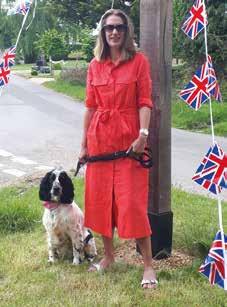

She never lets it get on top of her,
As a parent, worrying about your children never goes away, whatever age they are. But the best thing we can do is just be there for them at all times.
To finish my story, I think the best thing any parent can ask for with a child who is diagnosed with pulmonary hypertension is that they grow up with a positive attitude.
John and I have learned a lot concerning this devastating illness and over time we have learned from Sarah to become strong like her.
One day there will be a cure, I'm sure. But until that day, we will carry on by being loving and caring parents always. We are very proud of our daughter and always will be.
familymatters AUTUMN 2023 emphasis 31 You can read Suzanne’s letter in full at www.bit.ly/Celebrating-Sarah
Sarah with her husband Grahaeme
With her beloved dog Poppy
Suzanne
Join our panels and shape work...our
Members of our Feedback Forum and Research Forum panels play a key role in helping to guide PHA UK activities and contribute to important research work.
We contact all forum members with opportunities via email, and it is up to you whether you respond. We appreciate that PH comes with bad days so we understand if you need to give some of our invitations a miss. If it’s not for you at that time, simply ignore the email and look out for the next!
FEEDBACK FORUM
Whether it’s a booklet, poster, video, or web page, we need to be sure that it meets the needs of the PH community.
That’s why we’re building a mix of people affected by PH - patients, and their loved ones too - to give us feedback on new materials before they are launched. Your opinions are really important, and they help us make sure we’re getting things right.
As part of our Feedback Forum, we’ll ask you to spend a little time reviewing our materials before they are launched. This may be in the form of reading a leaflet, watching a short video, or having a look at a web page.
You will then be asked to fill in an online form with your thoughts. Sometimes, we may ask your thoughts on an idea for a campaign or project during the planning stages, to ensure we are taking things in the right direction.
Join at www.bit.ly/PHAUKfeedbackforum
RESEARCH FORUM
There’s never been a more important time to lend your voice and experiences to PH research. As well as conducting our own studies to help people affected by PH live better lives, we are regularly approached by researchers from healthcare and academia, who recognise the importance of the patient voice.
Our Research Forum is for patients and loved ones or carers who would be willing to help with these studies when possible.
They often involve completing surveys or questionnaires, and sometimes they may involve online or telephone chats, or focus groups. Occasionally, you may receive an invitation to be involved in a different type of study, but it is unlikely you will be asked to take part in a clinical trial in this way.
Join at www.bit.ly/ResearchForum_PHAUK

AUTUMN 2023 emphasis 32
Get involved in your own time, from the comfort of your own home.
Neil Hamilton is a Consultant Pharmacist at the Sheffield Pulmonary Vascular Disease Unit. He has many years of experience in the field of PH, both in his clinical role and through his long-standing association with the PHA UK.
expert advice

Be ready
As the colder months approach, it’s important to guard against seasonal viruses including flu and COVID-19. Consultant Pharmacist Neil Hamilton explains how…
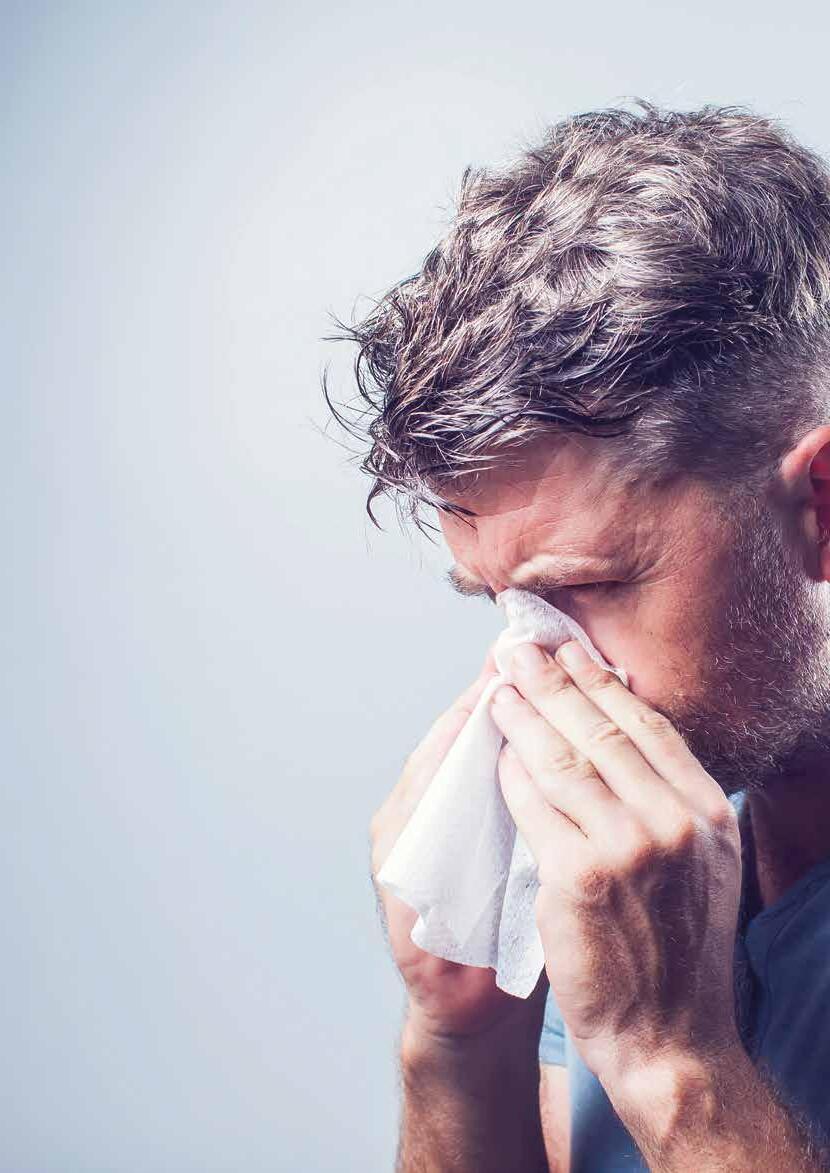
As I look back to the summer, I’ll remember it for the highly unpredictable weather, making planning tricky! Some of you may have heard of the Tramlines music festival here in Sheffield. The festival was held at the start of the summer school holidays. Bizarrely, instead of enjoying the line up with friends in the sunshine, we had the wettest July on record and the whole park turned into pools of mud – which only the most determined fans endured to the end of the headline sets. There was a desperate need for ponchos rather than parasols!
When I came into work at the hospital the following week, and discussed the festival with colleagues, those that went prepared still really enjoyed it. It was a good lesson that by being ready, they could make the best of it – and the same applies to winter and your health.
‘Readiness’ this winter will look different to everyone, but from a health perspective it will mean guarding against seasonal viruses.
Continued overleaf...
AUTUMN 2023 emphasis 33
The importance of vaccinations
We don’t hear or see mention of COVID-19 on the news anymore and whilst we may be over the worst of the pandemic, it is predicted that infection levels may rise again in the winter.
This will be coupled with annual flu transmission, and I’d recommend that you book in for a vaccine of both as soon as you are able.
We know that patients with pulmonary hypertension (and many other chronic heart and lung conditions) are at higher risk of serious illness from influenza.
Every year there is a national publicity campaign from the NHS aimed at getting people protection from severe flu through vaccination. If you haven’t seen adverts yet, I am sure it won’t be long. Please do take up the vaccine. It will be the best way of guarding against a nasty bout of flu.
Should you happen to contract flu, despite best attempts to avoid it, there are some antivirals that are prescribed for short
courses (usually five days) which can reduce the severity and length of symptoms.
These are called oseltamivir (oral) and zanamivir (inhaled or intravenous). These will not interact with any of the medicines prescribed for PH, so you would be advised to take these if deemed necessary by your doctor.
The same applies to COVID-19. The Joint Committee for Vaccination and Immunisation (JCVI) recommends an autumn booster for the most vulnerable, and this includes people with pulmonary hypertension. It is also available to all adults aged 65 and over.
The rollout began in September, a month earlier than expected, and the aim is for as many people as possible to be vaccinated by 31st October.
By the time you read this magazine, the appointment booking service on the NHS website should be open. You may also be contacted by your surgery.
Last year’s autumn booster saw take-up from nearly two-thirds of over 50s, and 82.4% of those aged 75 and over. I hope people (especially those with pulmonary hypertension) will not be complacent, but instead keep aware of developments and book in when they can.
Treatments for COVID-19
Earlier this year, PH was added to the NHS’s list of conditions which it regards at the highest clinical risk from COVID-19 infection.
This is important recognition because it means that anyone who is prescribed PH medication from one of the specialist centres could receive COVID-19 treatment if required. The treatments are either antivirals (Paxlovid, remdesivir and molnupiravir) or monoclonal antibodies (currently sotrovimab). More information about these treatments is available at www.bit.ly/C-19Treatments
If you have (even mild) symptoms of COVID-19, you need to take a lateral flow test as soon as possible. If the result is positive, call
your GP or NHS 111 urgently and they can refer you for treatment.
At this point, you will need an up-to-date list of your medication (including your PH treatment) because unfortunately the COVID-19 treatments may interact with some other medicines that you may be taking.
From a PH perspective the most important interactions are between one of the COVID-19 antivirals (Paxlovid), which interacts with sildenafil, tadalafil, bosentan and riociguat. Taking these together could result in significant side effects from your PH medication. As a result, if you are prescribed one of these, you should not use Paxlovid tablets. Instead, you should be given an alternative oral treatment, which
is most likely to be molnupiravir capsules. Other options could also be remdesivir (another antiviral) or sotrovimab (which is an antibody), but these are infusions so would be given in hospital.
Both your GP and the team at NHS 111 will be able to check for interactions (so you won’t need to check with your specialist centre). But to reiterate, it is crucial that you are ready with a full list of your medicines so these checks can be made for your safety.
We have seen levels of COVID-19 start to rise since the summer with a few colleagues here at the Royal Hallamshire Hospital needing time off work. Fortunately, none were very poorly, but we know that our patients are likely to be affected much more than most. So please, take the opportunity to be well prepared this winter.
expert advice
Be
AUTUMN 2023 emphasis 34 All information correct at the time of going to print, 1st September 2023
ready
A reminder about homecare medicines
All medication for pulmonary hypertension must be prescribed by your specialist centre and delivered to you.
Wintertime can have an impact on these services but there are several ways that you can help to make your deliveries run smoothly.
All of these highlight the need for a good relationship and communication:
> Make sure you are in at the agreed time slot to receive a delivery. The NHS has to pay for each delivery slot, so it is crucial these are not wasted.
> Your delivery company may use a number which shows on your phone as “unknown/withheld number”. This is also true of the hospital. Please do not ignore these calls if possible.
> If you miss a call from homecare, please return their voicemail message.
> The NHS contract requires homecare companies to ask you for a regular stock check. If this is not possible when they call, please do this as soon as you can and call them back.
> If you get into your last two weeks of supply and you have not heard from your company, pleas call them. Last-minute or emergency delivery runs are difficult for everyone and costly to the NHS. These can and should be avoided.
If you have any queries regarding your stock levels or delivery dates, your PH centre is unlikely to have the information you need, so the best people to contact are the delivery companies directly.
Here is a reminder of their contact details:
SCIENSUS
0333 103 9499
(formerly known as Healthcare at Home)
LLOYDS PHARMACY CLINICAL HOMECARE
0800 090 2056
POLAR SPEED
0800 783 3178 (+ option 3)
PHARMAXO
01225 302188 (+ option 1)
HEALTHNET
0800 083 3060
AUTUMN 2023 emphasis 35
Let’s get
When PHA UK member Rob Owens (pictured with his son Lewis) had to give up work due to his pulmonary hypertension, he started to fill his time by writing quizzes for friends. He has shared one of his favourite’s with us, and you’ll find the first two rounds here. Look out for more next issue!
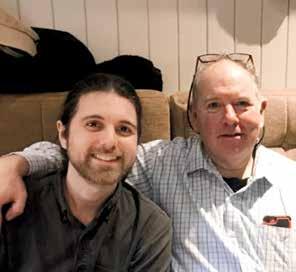
TV&Film... TV&Film...
quizzical qui ? ?
1. Peter Griffin is the main character in which American cartoon?
2. Boo Boo Bear was the best friend of which other cartoon bear?
3. What is James Bond’s middle name?
4. Which daytime TV series is set in the fictional Letherbridge area of Birmingham?

5. Who played the film character Bridget Jones?
6. In what decade was BBC’s Crimewatch first shown?
7. Which former president of the USA had a cameo role in Home Alone 2?
8. Martell Maxwell is a presenter on which BBC property show?
9. In the film Top Gun, what is Tom Cruise’s character’s call sign name?
10. Who was the original presenter of BBC’s Bargain Hunt?
?
? ?
AUTUMN 2023 emphasis 36
Food&Drink Food&Drink
1. The Bramley cooking apple originated in which English county?
2. A locking container traditionally used for alcohol spirits and named after a Greek god, is called what?
3. Gubbeen cheese is produced in which country?

4. What’s the name of the dried meat snack produced in South Africa?
5. Which herb is derived from the plant laurus nobilis?
6. Which African country produces the most coffee – Ethiopia or Kenya?
??
7. Which chocolate bar was advertised with the parody song ‘Unforgetabubble’?
8. Which African country is the world’s biggest producer of coco (for chocolate production)?
9. Which brand of soft drink was created by Germany in WW2?
10. Hot cross buns originated in which English cathedral city?
Why not get friends or family together and enjoy this quiz as a fundraiser for PH Day UK?
‘Charge’ an entry fee and enjoy some good-natured rivalry! Find out more about PH Day UK on page 10.
Look out for the next two rounds in the winter issue, or download the full quiz now at www.bit.ly/Robs_Quiz

ANSWERS: TV AND FILM
1. Family Guy 2. Yogi Bear
3. Herbert 4. Doctors 5. Renee Zellweger 6. The 1980’s
7. Donald Trump 8. Homes Under the Hammer 9. Maverick 10. David Dickinson
ANSWERS: FOOD AND DRINK
1. Nottinghamshire
2. A Tantalus
3. Ireland 4. Billtong 5. Bay leaves
6. Ethiopia 7. Aero 8. Fanta
AUTUMN 2023 emphasis 37
9. Ivory Coast 10. St.Albans
? ical
?
? ?
Taking pride in self-discovery withPH
After a difficult time through the pandemic, columnist Raya Mynot took some time to discover herself. With a changed name, and a partner that understands her PH, she’s now happier than ever – and proud to share her experiences with you here.

So, I want to start off this article by saying HAPPY PRIDE, even if you don’t celebrate it.

Pride has always had such a special place in my heart. The Pride community is just so inclusive, accepting and proud. I just love that. I attended the Brighton Pride festival this year and it really was amazing (it always is!).

Having PH makes us different to others and growing up that was really hard to get used to. Not being able to always join in at school, having to skip activities, or outings with friends because they were just too much for me, was really hard sometimes. I definitely felt out of place at times.
My mum used to tell me to always be myself, and if people didn’t like or accept that then it was their problem – not mine.
One day something really did just click in my mind, and I truly stopped caring what people thought about me and my PH.

Self-discovery can really be challenging in itself, let alone having to do it alongside a physical condition.
But my family have always been so open and honest, so I have grown up knowing I can always talk to my mum about absolutely anything. Having such a supportive family definitely helped massively. I really don’t know what I’d do without them all.
As you’ve probably noticed, the name on my article changed from Kaylee to Raya a few months ago. During covid and lockdown I went into a pretty dark place and had a lot of problems with my mental health.
After seeking support (which is always okay to do, if you ever need it!) I had talked through a lot that was on my mind and it really did help. I found myself having better days, finding myself again, finding my own style, and making new friends through some new hobbies I’d picked up. It was really refreshing.
I’m writing this following Pride month in June, which is a month dedicated around the world to celebrating the lesbian, gay, bisexual, transgender and queer (LGBTQ+) community.
Raya'scolumn
Continued... AUTUMN 2023 emphasis 39
I think as person I’d been though a lot in life and after covid I just needed a fresh start. I also started to feel like my name didn’t fit my persona. So, I just decided to shorten my middle name of Soraya and become Raya (she/they).
It definitely took my family a little bit of time to get used to it all, but they really have been amazing. My mum is enjoying looking through names again as I’ve given her the task of picking my middle name before I legally change it to Raya.
It’s also felt so amazing to introduce myself as Raya to new people and new friends. This really was a turning point for me, and I started to love who I was becoming again.
Getting yourself out there with a physical condition can be challenging. At school most people were in relationships or talking about who they had a crush on etc, and that was just not for me.
I wasn’t into the whole relationship thing, and I was certain I wanted to spend life alone being independent. But it definitely just takes that one right person.
Having new hobbies meant a whole new group of friends, and that’s when I met Jade (she/her).




She really did come along when I least expected it, but it turns out it was also when I needed her most. She’s been amazing when it comes to understanding my PH and knowing my boundaries etc.
Jade accepted me and my PH so willingly, it was just so amazing for me. Shes never made me feel different, never treated me any differently, and most importantly hasn’t wrapped me in bubble wrap like I’m going to break (if you’ve read of my previous columns, you will know this is my biggest pet peeve!)
Jade came to my last hospital appointment with me at my specialist centre and it was just so nice to have her there as support. I also think it was beneficial to her too, as she was able to hear more about my PH.
I love that Jade is also comfortable asking me questions about PH.
I’ve let her read some of my past Emphasis columns too which she really enjoyed, so I know she will love reading this. Jade, I love and appreciate you so, so much!
I guess that brings us to the end of the article. I really have enjoyed writing this one.
Remember to always be yourself, and don’t worry about what others think. Your happiness is most important and always comes first!
Be proud of who you are.
AUTUMN 2023 emphasis 40 Beforesettingoffto BrightonPride2023
FOCUS Fundraising you’veHowbeen fundraising for our charity...
Friends KENNA STEWART, DONNA MACLEOD BRAY AND DONALDA MACKINNON leapt from a plane over Scotland to raise over £2,300 in memory of Kenna's mum. As a double amputee, it was even more a challenge for Kenna – but she told us she loved every minute: "It was a huge adrenaline rush and I'd do again in a heartbeat. To say we are delighted with the amount raised is a huge understatment."
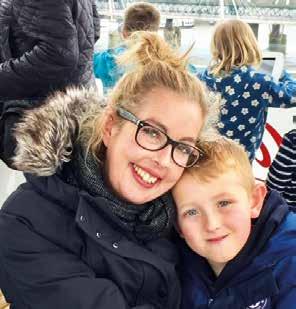
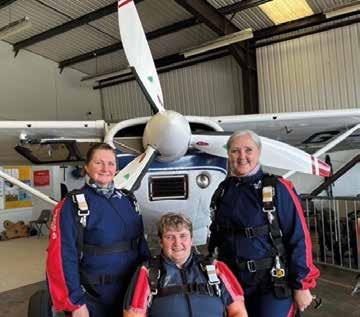

When HENRY LING'S football team won a school tournament, he asked for their prize money, along with additional fundraising, to be donated to the PHA UK in memory of his mum Laura. Henry lost her five years ago and on the right is his favourite photo of them together. He is also pictured with his winning trophy, and with his little sister Rosie-May.

More fundraisersfabulousover the page >>>>>>

AUTUMN 2023 emphasis 41
FOCUS Fundraising

PAUL DUNN walked a marathon over the space of a month to raise over £900 including Gift Aid. He completed the challenge after work and at weekends, clocking up the miles in support of his mum.
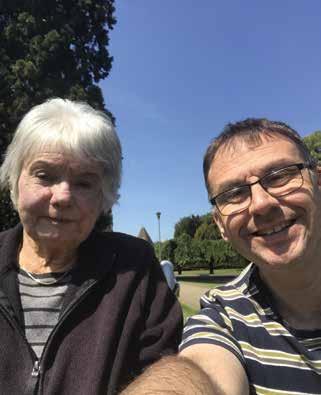
BARBARA SCOLLICK and her husband BOB celebrated their 50th wedding anniversary by asking friends and family for donations to the PHA UK in lieu of gifts. Barbara, who was diagnosed with PH in 2012, also collected funds via Facebook.


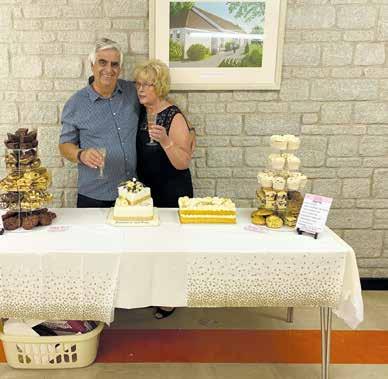
In October, over 100 pupils (the whole of Year 9!) from THE GRAMMAR SCHOOL AT LEEDS will take on the Yorkshire Three Peaks Challenge, hiking 24 miles with almost 1600 metres of ascent. The group chose our charity because their teacher Dan Williams has a two-year-old son, Rory (pictured) who lives with PH. Look out for more on this in the next issue!
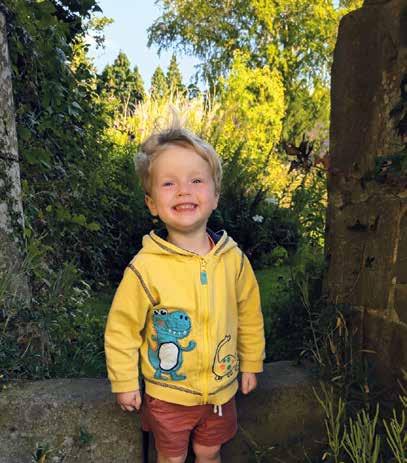
GOOD LUCK!
Fitness lover Hannah Brown took on a September half Ironman challenge in support of her father, who was diagnosed with PH earlier this year. The event in Weymouth consisted of a 1.9km swim, 90km cycle and 21.1km run – all on the same day. Hannah is pictured second from left on a family day out with mum Vanessa, sister Emily, and dad Stephen.
AUTUMN 2023 emphasis 42
Despite summer rain, an open garden event held by PHILLIP JONES was a huge success, raising almost £700 for our charity. His wife NERYS cherished her garden, and Phillip plans to make this an annual event in her memory.


The team at CLASSIC MARQUE SPORTS CAR CLUB (CMSCC) are racing through their second season of supporting our charity, as part of a three-year fundraising partnership. Club members, who organise classic car racing events around the country, chose the PHA UK in memory of Sandra Walton. She shared her husband Nigel’s passion for motorsport and often accompanied him at CMSCC events.


She did it! KAREN DOAK, interviewed in the last issue of Emphasis, completed her 1000-mile run from Land’s End to John o‘Groats in style. The run took 35 days, covering the entire length of the UK, and Karen was thinking of her friend Wendy with every step. Accompanied by partner Paul, she raised over £7,500 – which has been split between ourselves and The Seafarers Charity.
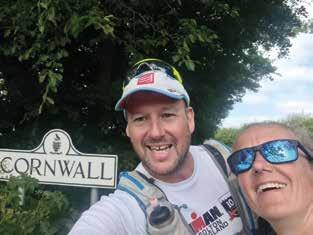
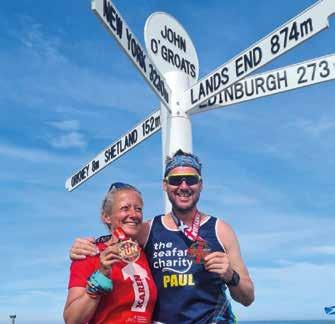
Every penny counts, and LOU CHADBURN managed to stack up £94 by popping loose change into a piggy bank over the course of six months. If you’d like a coin collection box to do the same, simply send us an email.
Want to tell us about your fundraising, or have any questions? Email fundraising@phauk.org
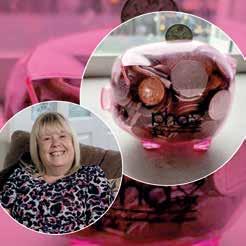
AUTUMN 2023 emphasis 43
Staying POSITIVE through the tough times

Jane Machell hasn’t had an easy journey since being diagnosed with chronic thromboembolic pulmonary hypertension (CTEPH), but she’s found ways to keep smiling.

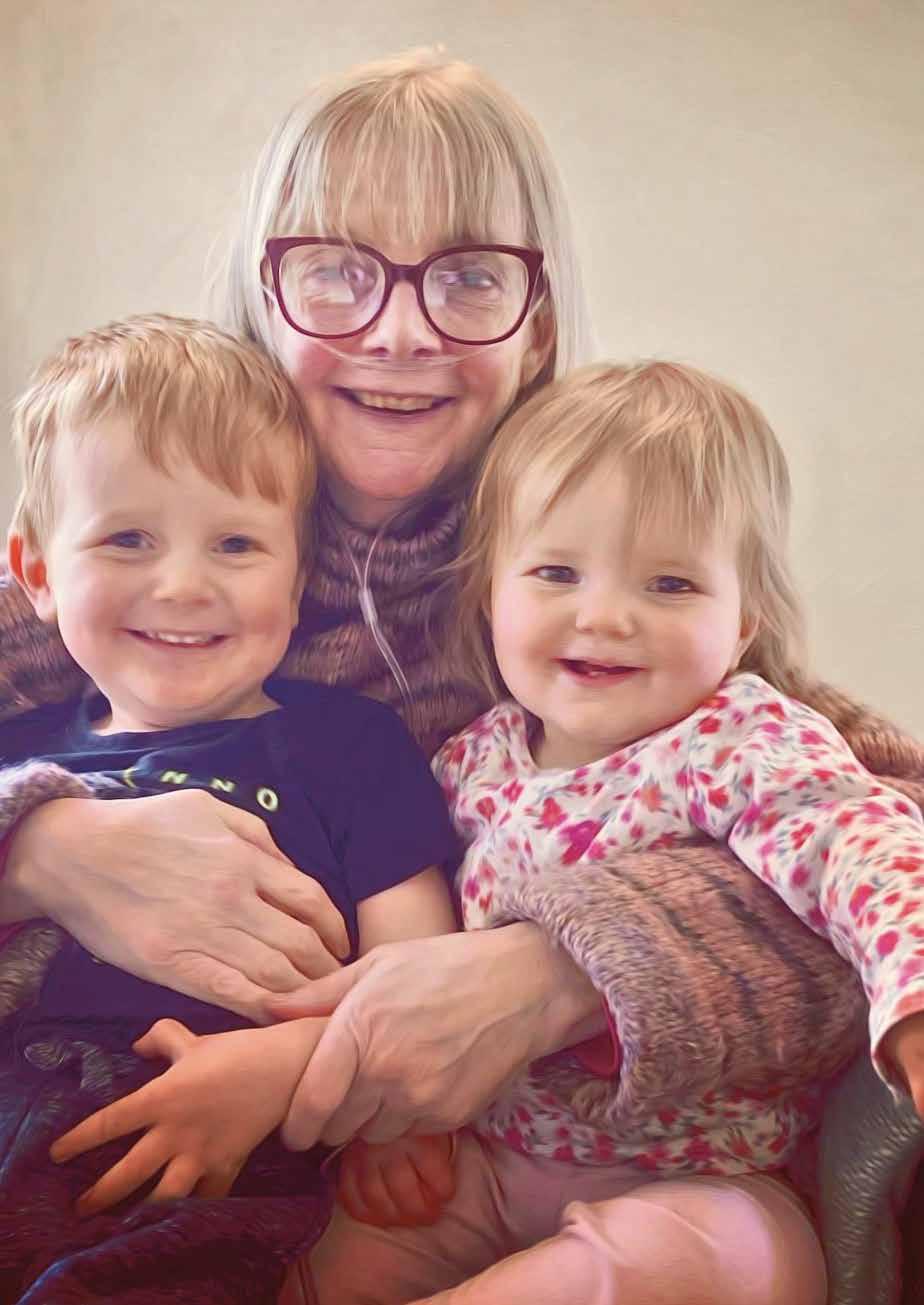
AUTUMN 2023 emphasis 44
My symptoms started after I had a hip replacement in 2020. I was very breathless, my legs were swollen and aching when I was walking, and my heart was racing.
Things eventually got so bad that I was admitted to hospital, and I was diagnosed with CTEPH in October 2021.
I was put immediately on sildenafil, and then macitentan too, and a few months later I was deemed eligible for a pulmonary endarterectomy (PEA) –pioneering surgery to remove the clots from my lungs.
The surgery went ahead on September 30th 2022, at Royal Papworth Hospital. I had what is termed ‘good technical clearance’ of the clots, which means there are still some there.
There were complications which meant I stayed in hospital a lot longer than I expected. I had a lung reperfusion injury (where my right lung became inflamed and may have had a long-term effect) and I spent two weeks in Critical Care / ICU.
I then had a bleed on the brain. Fortunately, it didn’t lead to any problems or damage and stopped bleeding of its own accord, but it meant I spent another two weeks in hospital.
About two months after I was discharged, I then suffered an aneurysm / bleed of the splenic artery. I had awful abdominal pain, and ‘normal’ surgery to repair it couldn’t take place because it was too risky so soon after the PEA. I ended up undergoing a two-hour procedure without sedation and spent another eight days - including Christmas Day - in hospital. I was told that the anticoagulants I was on were to blame.
When I eventually had my post-operative review for my PEA, after six months, I had a day of tests and was told that my pressures were the same as before the surgery. I was told I still had severe PH, and a reduced life expectancy. It was hard to hear and very upsetting.
I have been on long-term oxygen therapy for around 15/16 hours a day and I still take sildenafil and macitentan. I am also using ambulatory oxygen.
I’m waiting to see if I can have balloon angioplasty (BPA - a relatively new procedure that uses tiny balloons to target hard-to-reach clots), and I’ve had lots and lots of tests, which has all happened quickly. I think when you are in urgent need of the NHS, it works very well.
Although my PH is still classed as severe, I’ve been told my heart is coping better since the PEA and I’ve started pulmonary rehab, which involves attending classes with other people who have lung conditions.
I’m trying to walk as much as possible, carrying oxygen in a backpack, as I think it’s important to be as active as I can. I can do stretching, and I can still drive, which is good. I’m managing to get out and about and I’m a keen gardener, so I grow vegetables in
Main image: With my other 2 grandchildren at home, 5 months post-PEA. My use of oxygen doesn’t bother them now.
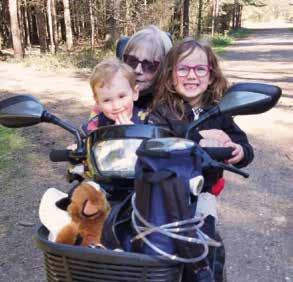
Left: Trying to live as much as I can with a shortened life expectancy still. This is on a walk 6 months post-PEA near our home in the New Forest.
Right: Visiting a friend in Somerset. It was very difficult to eat post-PEA. The prolonged intubation period being on a ventilator caused mouth ulcers and mouth thrush. I can now enjoy my food!
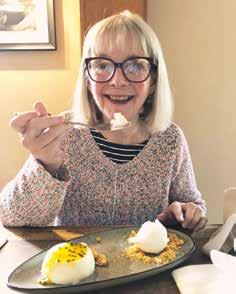
containers and I love it, with help.
I am very lucky to live in a lovely part of the world, in the New Forest in Hampshire, where there are lots of accessible walks not far from my house.
There are lots of ‘wild’ horses which roam freely around the New Forest and this year I have seen many foals. I love watching nature change as I walk.
I’ve got four grandchildren and they really help to keep me positive. They are fantastic, and they all just accept that I am on oxygen – unlike some adults, who can stare or patronise.
When the youngest was learning to walk, she kept grabbing hold of my oxygen tube and wrapping it around her neck, pretending to be me. It had me in hysterics.
My grandchildren have been a large contributor to my healing and recovery. When going through really bad nights in Critical Care, it was images in my head of these four that helped me sleep and encouraged me to want to get better. They still have that effect.
I think I started everything with a positive mindset in the first place. It’s not my nature to think the worst f everything so that helps. I have had a lot of support from my family, and I’ve got some fantastic friends.
My sister set up a WhatsApp group for friends and family when I had the operation, so she could fill people in on how I was progressing.
Technology has been quite helpful through all of this. I’m part of two Facebook groups for people who have CTEPH and PH, and for my birthday, I did a Facebook fundraiser that raised £400 for the PHA UK. People are prepared to give, and it was a positive way of raising awareness too.
I think it’s important to share different experiences of PH and treatments. The statistics show that most people do have improved quality of life - and better life expectancy - after the PEA surgery, and I don’t regret having it. I have just been very unlucky.
My care at the Royal Brompton, Southampton, Lymington and Royal Papworth hospitals has been excellent, and that’s another positive from what I’ve been through. I’ve definitely seen the best of the NHS.
AUTUMN 2023 emphasis 45
Left: With two of my grandchildren in Thetford Forest, 6 months post-PEA. I needed to hire a mobility scooter and take my oxygen.
Food for thought...
Our regular nutrition feature to help you make the most of life
CARBOHYDRATES:
YOUR BODY’S ENERGY POWER HOUSE
Have you ever wondered how your body manages to stay active throughout the day, allowing you to complete tasks and activities? Even when you feel wiped of energy due to PH?
Well, the answer lies in the wonderful world of carbohydrates! These little energy powerhouses play a crucial role in fuelling your body for everyday activities, from making breakfast or sorting out the washing, to playing with the grandkids or going for an afternoon walk.
So, let's dive in and explore how carbohydrates become your reliable source of energy.
Imagine your body as a high-performance car, and carbohydrates are like the premium fuel that keeps it running smoothly. Carbohydrates are one of the three main macronutrients, along with proteins and fats, that provide energy and nourishment to your body. They are found in various foods like grains, fruits, vegetables, legumes, and dairy products.
When you eat foods rich in carbohydrates, your body starts the digestion process by breaking them down into simpler sugars like glucose. Glucose is like the fuel that powers your cells and tissues, giving
you the energy to attack the day! Once glucose is produced, it enters your bloodstream and travels to every nook and cranny of your body, providing energy to your muscles, brain, and organs.
Now, here's the cool part, your body knows exactly just how much glucose you need to tackle your day-to-day tasks. Any extra glucose that isn't immediately used for energy gets stored in your liver and muscles as glycogen, ready to be released when you need an extra boost. It's like having a reserve tank of energy to rely on during those intense physical moments or mentally demanding challenges.
AUTUMN 2023 emphasis 46
By Shaun Clayton, a certified nutritionist and Operations and Finance Director at the PHA UK

Let's see how carbohydrates power you through different activities:
1. MORNING KICKSTART
Ever feel that instant burst of energy after eating a good hearty breakfast? That's your body utilising the carbohydrates from your morning meal to get you up and running.
2. PHYSICAL ACTIVITY
Whether it's a gentle swim or a brisk walk with friends - anything physical at all really, carbohydrates play a crucial role in providing the energy required for your muscles to perform to their best.
3. MENTAL FOCUS
Carbohydrates aren't just for physical activities; they are also essential for mental focus and concentration. When you're tackling a tricky problem that requires some serious brain power, your brain relies on glucose to keep those cogs turning.
4. AFTERNOON SLUMP
Feeling a bit sluggish in the afternoon? A healthy carbohydrate-rich snack can give you the energy pick-me-up you need to power through the rest of the day.
5. DAY-TO-DAY CHORES
From walking the dog to doing household chores, carbohydrates are there to keep you going, ensuring you have the stamina to get as much done as you can.
It's important to choose the right kinds of carbohydrates to keep your energy levels steady and avoid sudden crashes. Whole grains, fruits, vegetables, and legumes are excellent sources of complex carbohydrates that release energy slowly, providing you with a steady supply throughout the day. Unfortunately, try as I might, I can't find a single study that shows doughnuts are a 'good' fuel source... but I’ll keep looking!
On the other hand, simple carbohydrates like sugary treats and processed snacks may give you a quick energy spike, but they can lead to a sudden crash, leaving you feeling drained and hungry again soon after.
Carbohydrates are your body's primary source of energy, fuelling you for all your day-to-day tasks and activities. Embrace a balanced diet that includes wholesome sources of carbohydrates to keep your energy levels stable all day long!
If you have a question about food and PH, email nutrition@phauk.org and Shaun will happily provide some guidance.
Nutrition continued
AUTUMN 2023 emphasis 47
ultra-processed food THE PROBLEM WITH

CHERMAINE KWANT IS A REGISTERED DIETICIAN WHO HAD PH BEFORE UNDERGOING A LUNG TRANSPLANT, AND SHE IS SHARING HER EXPERTISE AS PART OF OUR PARTNERSHIP TO HELP PEOPLE ENJOY A GOOD QUALITY OF LIFE. THIS ISSUE, SHE LIFTS THE LID ON ULTRA-PROCESSED FOOD…
Avoiding ultra-processed foods is my biggest piece of advice for anyone trying to eat for better health.
Ultra-processed foods are products which have been altered from their original state through the addition of lots of different ingredients, many of which are artificial.
Examples of common ultra-processed foods are ice cream, breakfast cereals, biscuits, flavoured yogurt, instant noodles, ham, and sausages.
A telltale sign of ultra-processed food is a long list of ingredients. I always tell my patients that if you look on the label, and there are ingredients you can’t pronounce or you have never heard of, it’s better to put it back on the shelf.
There are a lot of artificial elements in these products. We still don’t know what the long-term effects of these are on our health, but there are some recent research papers that describe the negative impact of ultra-processed food on cardiovascular disease.
A lot of products labelled ‘low fat’ are often ultraprocessed, and this is because the fat has been taken out, so other things have to be put in to ensure they still tastes good.
A good example of this is low fat peanut butter. The fat may be lowered, but the amount of sugar will be tripled or even quadrupled to make up for it, making it more equivalent to chocolate spread.
People often think ‘light’ or ‘low fat’ versions of foods they love are better – but they are often more processed than the original product.
When I see patients in my work as a dietitian, I always start by advising them to reduce the amount of ultra-processed foods they eat.
The easiest way of doing this is to prepare your meals yourself. You can see exactly what goes into them, and that’s the biggest win there is. The biggest gift you can give to yourself is investing in the time to prepare your meals.
Having had pulmonary hypertension myself, I understand that fatigue can be a barrier to this. Making ‘one-pan meals’, where everything is prepared in one pot, can help and you can find out more about this in a video I made with the PHA UK at www.bit.ly/one-pan-meals.
Batch-cooking on your good days is a great idea too as you can have nutritious meals ready in the freezer for your bad days. And although there may not be scientific evidence for this, my own experience shows that when you stop eating ultra-processed foods, you are likely to gain more energy –which will help when it comes to cooking.
Preservatives are one of the problems with ultra-processed foods. If something stays fresh in its packet for five years, what does it do to your body?
When I was ill, cutting out ultra-processed foods made a huge difference to how I felt and that’s why it’s such an important piece of advice.
Food for thought...
Eating this type of food once or twice a week isn’t a problem, but it is if you eat it every day, throughout the day.
AUTUMN 2023 emphasis 48
DEFINING PROCESSED AND ULTRA-PROCESSED FOOD
The information below comes from the British Heart Foundation (www.bhf.org.uk)
Using a food classification system, food is placed into four categories based on how much they have been processed during their production:
1. UNPROCESSED OR MINIMALLY PROCESSED FOODS
This includes produce such as fruit, vegetables, milk, fish, pulses, eggs, nuts and seeds that have no added ingredients and have been little altered from their natural state.
2. PROCESSED INGREDIENTS
This includes foods that are added to other foods rather than eaten by themselves, such as salt, sugar and oils.
3. PROCESSED FOODS
These are foods that are made by combining foods from groups 1 and 2, which are altered in a way that home cooks could do themselves. They include foods such as jam, pickles, tinned fruit and vegetables, homemade breads and cheeses.
4. ULTRA-PROCESSED FOODS
Ultra-processed foods typically have five or more ingredients. They tend to include many additives and ingredients that are not typically used in home cooking, such as preservatives, emulsifiers, sweeteners, and artificial colours and flavours. These foods generally have a long shelf life.
Chermaine recommends eating minimally processed foods, like this chicken salad and homemade ciabatta.
My day on a plate
Ever wondered what a dietician eats? Here’s what Chermaine dined on the day before we spoke to her for this feature:

BREAKFAST
Crackers with cream cheese, sliced red pepper, and two boiled eggs
DINNER
LUNCH
A bowl of full fat Greek yogurt with nuts, grapes and spelt (a type of wheat)
Grilled chicken with a large salad, caramelised onions, cheese, roasted pine nuts and homemade ciabatta (pictured above).
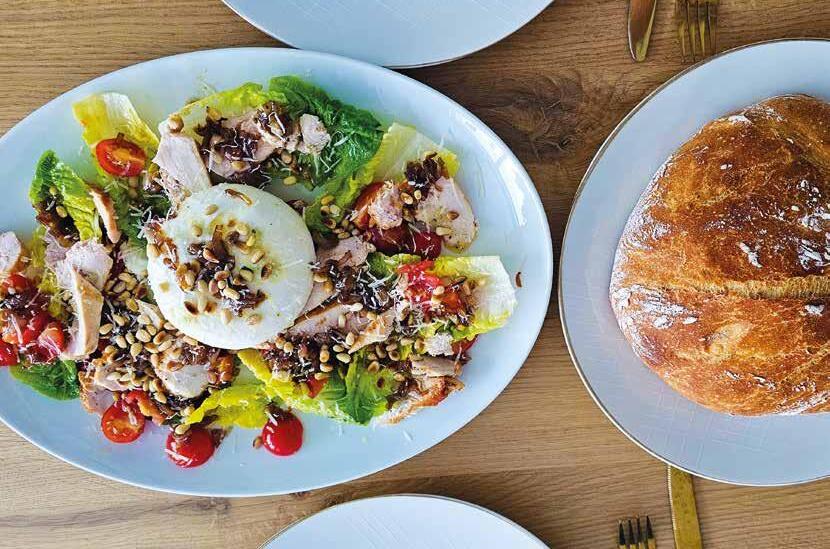

food
AUTUMN 2023 emphasis 49
It’s time to talk about treprostinil


Often remembered by its old brand name Remodulin®, treprostinil is a PH drug that hasn’t been prescribed to new patients in England and Wales since 2014. But could this be about to change?
ew treatments for PH are being researched as you read this, and there are promising therapies on the horizon. But whilst we all wait for their development, there are also some that already exist – yet have not been used to their full extent in the UK.
Treprostinil (Remodulin®) is one of these drugs. It’s been used around the world since 2002 but it’s been nine

years since it’s been prescribed for any new patients in England and Wales.
Three years ago, the regulators approved it for prescription in Ireland (it has been used unlicensed there for many years). Following this, in 2022, the NHS in Scotland authorised it for PH patients at the Golden Jubilee National Hospital in Glasgow. It is also already prescribed in many other countries across the globe.
Understanding treprostinil
Many of you will be familiar with drugs known as PDE5 inhibitors, which include sildenafil and tadalafil. They work by dilating the vessels in the lungs to help the blood flow more easily.
There is another group of drugs called endothelin receptor antagonists (ERAs), which work slightly differently but are often prescribed alongside the likes of sildenafil and tadalafil. Being on both types of drugs is known as ‘dual therapy’.
Some patients need more advanced treatment via the addition of a third type of therapy (triple therapy), so there is a third class of drug called prostacyclins. This is the class that treprostinil sits in.
Prostacyclins are the most expensive and complicated class of drug, and instead of being taken as a tablet, they must be either inhaled through a nebuliser, given intravenously through a line into the chest, or given as an infusion under the skin (also known as ‘subcutaneous delivery’).
The most common of
N
Medication spotlight AUTUMN 2023 emphasis 50
these types of drugs, and the one most people will have heard of, is epoprostenol – which can only be given intravenously through a Hickman line.
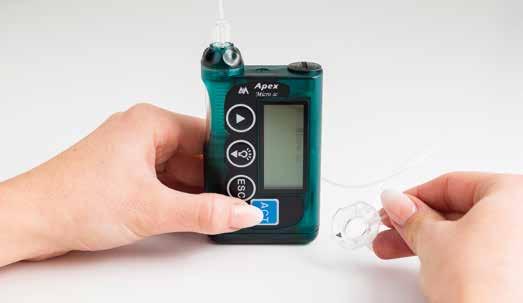
Another example is iloprost, which is nebulised into a mist and inhaled directly into the lungs, using a special nebuliser called a Breelib. As it’s a short-acting drug, nebulised iloprost must be taken between six and nine times a day.
Like the other drugs in its class, treprostinil is a powerful ‘vasodilator’, working by opening blood vessels to allow more blood to flow through the narrowed vessels in the lungs.
The difference between treprostinil and other drugs is that it is designed to be given as a continuous infusion under the skin (subcutaneously) instead of through a Hickman line. It’s administered automatically via a small pump, connected to a very fine needle via a little plastic cannula under the skin.
The syringes need changing (by the patient) every two or three days. And once every one or two months, the infusion site - where the needle and cannula go into the skin - needs changing to a different part of the body. This can also be done at home by the patient, without the need to go to hospital.
Most people keep the infusion site around the abdomen, moving it to different places within that area. Patients can cover the site with a waterproof dressing if they want to have a bath or shower, or to swim.
There is a high risk of pain around the injection site with treprostinil because the administration method can sting. Some people describe it like a bee sting, and others describe it like sunburn. Some patients have very little pain, and some have a lot more.
The pain tends to be concentrated around the days after the patient changes the site, and then it settles down. But some do find it too painful to continue with the drug in this way.
If this is the case, there is an option of it being delivered intravenously. Painkillers can be discussed with a patient’s specialist team.
Why treprostinil isn’t prescribed anymore in England and Wales
When the drug was launched worldwide 20 years ago, it wasn't given a UK licensing approval. It was only available here as an imported, unlicensed drug – meaning it could still be prescribed, but only in special circumstances.
In the meantime, new drugs became available (primarily the PDE5s and ERAs discussed at the start of this article). So, in 2014, when the UK regulators took the decision that they would not award a licence, the manufacturers greatly increased the price for importing treprostinil. The NHS decided the higher cost of treprostinil (then known as Remodulin®) couldn’t be justified, and they asked the specialist centres not to use it for new patients. Those already taking it could continue, and there are still some patients on it today for this reason.
Treprostinil hasn’t been prescribed to new patients in England and Wales for nine years. Yet in this time, two major things have changed:
Treprostinil is now licensed in the UK, meaning it doesn’t have to be imported from abroad. Plus - crucially - it is now what’s known as a ‘generic’ drug, meaning it can be supplied by more than one company.
This means that instead of being limited to the brand-name Remodulin®, it now has the generic name of treprostinil – and it’s far cheaper. In fact, treprostinil is now a similar price to other drugs in its class,
including iloprost and epoprosetnol.
So why can’t it be prescribed now? Ultimately, the NHS hasn’t updated its guidance to the specialist centres since 2014, meaning the drug still can’t be prescribed to new patients.
Much of this is down to ‘red tape’, and it is hoped that NHS commissioners will re-evaluate and consider the changed circumstances soon.
The guidance was due to have been revised a couple of years ago, but as with many things, the COVID-19 pandemic has caused a delay.
A timescale for change
It’s not clear when NHS commissioners will see this as a priority, but we are hopeful things may start to be reviewed by the end of this year – meaning there’s a chance of prescriptions starting in 2024.
This is a drug that has been approved worldwide for decades but is still not available to patients in England and Wales. At the PHA UK we are prepared to fight for equity of access to this therapy, as we did for selexipag - with your help - a few years ago.
It does not matter to us who manufactures these drugs, and therefore profits from their prescribing. Our priority is ensuring that patients are offered choice, and access to the treatments that are right for them. In the face of a disease like pulmonary hypertension, nothing is more important. Watch this space! .
AUTUMN 2023 emphasis 51
One of the pumps that can be used with treprostinil
Specialist support from someone who understands
Our Listening Line support service gives you dedicated time with a PH professional to discuss your worries or concerns.

• Free and confidential
• An impartial listening ear
• Available to all PHA UK members, family and friends too
Talking to someone who already understands PH means you don’t have to explain your condition first.
Find out more or book an appointment by emailing listeningline@phauk.org or calling 0300 373 5367 Appointments can also be booked via our website at www.phauk.org
Calls take place with Paul Sephton, a former clinical nurse specialist in PH. Paul has many years of experience supporting people affected by pulmonary hypertension, both in a clinical environment and as part of the PHA UK team.

“Paul’s support lifted me. He was so understanding and supportive, and it was helpful to chat with someone who knows about this disease.”
PHA UK member
This is not a formal counselling service and it is not designed to replace clinical advice from your specialist centre team.
LINE PHAUK LISTENING
AUTUMN 2023 emphasis 52
JUST FOR KIDS!
ENJOYING LIFE WITH PH
Who says you can’t have fun with pulmonary hypertension?! Here’s what some of you got up to through the summer holidays…

IvyCwasdiagnosedwith doingPHtwoyearsagoandis reallywell.Hereshe is in ‘action’ at a summerfeteinhervillage��

Daisy had a great time collecting shells and stomping around on the sand at Prestatyn Beach!

Our regular cut-out section foraffectedchildren by

Connie didn’t let the wet weather spoil her fun at a ‘Bubble and Bop’ festival!
PH
Thanks to all the parents and guardians who sent in photos!
Ivy R enjoyed horse riding at a friend’s party. She’s pictured in the pink alongside her twin sister Martha.

Elsie, three, had fun on the swing at her local park.

AUTUMN 2023 emphasis 53
✄
Here’s Chase and his little sister Kyla visiting the National History Museum in London before his appointment at GOSH.
Young Emphasis columnist Emily, 11, has had PAH since she was three. This issue, she looks back on her first year at secondary school.


My first year at secondary school with PAH
by Emily Gravenstede
I felt fairly confident going into year seven, but I was just a little bit worried about how to tell others about my PH. This turned out to be fine because most people just accepted that I have a condition. A few of the teachers already knew and when I found getting around school difficult, my Head of Year gave me a pass to leave lessons five minutes early with a friend, and the majority of other teachers were happy to accept this. I just had to explain things to some.
My PE teacher already knew all about my PH and she was fantastic and I’ve really enjoyed PE this year.
Highlights of the year...
My favourite thing this year was playing the part of Wednesday in the school production of ‘The Addam’s Family’. I got to know students from other years and we all worked together to create a brilliant production, which was really fun. I also enjoyed the end of year awards ceremony. I was very lucky to receive four awards, including a head teacher’s award. I also got to sing a solo during the musical interlude.
Another fun thing was taking part in a school open evening in the autumn term. I got to help out in the drama room (I love drama and
staying in the drama room was easier than touring people around the school because I didn’t have to climb the stairs) and then gave a speech to all the prospective students and parents there. I received a letter from the head teacher thanking me for doing the speech.
I’ve loved lots of my lessons. A highlight was all of DT (design and technology), which included food technology (cooking and food theory), making a pencil box, a necklace and a maze. This was all very fun. I absolutely loved my English lessons this year because I enjoy the subject, but also we have a fantastic teacher. I’m sad that I don’t have the same teacher for English this year. In PE lessons I got to try netball, basketball, badminton, rounders and athletics (I really loved the high jump).
So, overall, I have had a very positive start to secondary school. Sometimes it is a nuisance having to explain about PH, but I have managed fine. The teachers have all been a great help and allow me to adapt things if I need to, for example, being able to move to my tutor room when the bell rings instead of lining up and having to stick to the pace of the crowd. I’m really looking forward to this year and what is to come next.
I hope you all have a wonderful year in school!
I have just started year eight and I decided to write this column to let you all know how year seven went and give those of you who are moving up to secondary school some top tips.
Emily x
Addams
Emily as Wednesday
✄ AUTUMN 2023 emphasis 54
Emily wearing her four school awards
Our websites are truly accessible to all
For many years, we’ve invested in technology that supports people with visual impairments and hidden disabilities to access our content in a way that works for them.
Our assistive toolbars will:





Read the on-screen text aloud
Translate words to a language of your choice
Simply tap this button at the bottom of each web page to access these features!
Give it a try at www.phauk.org
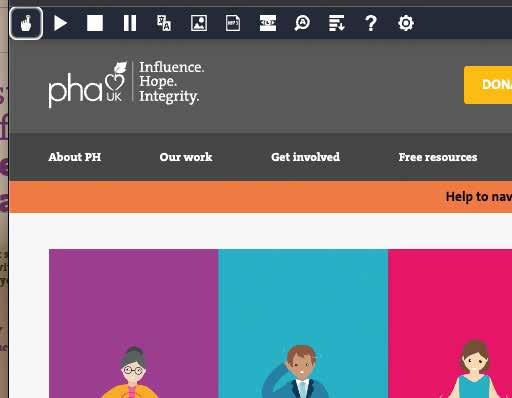
www.phocusonlifestyle.org
Display the meaning of words through illustration
Convert online content into MP3 files for easy listening

Generate a reading panel to reduce visual stress and improve focus

Magnify text size

Simplify how a webpage looks to remove distracting content

Safe spaces to talk to others affected by PH
Our private Facebook groups are a valuable source of support and advice from people who truly understand. Each group has a strict screening process to ensure those requesting to join are genuine, so you can be confident of privacy. They are safe spaces to talk to other people with similar lived experiences.
PHA UK Official Facebook group
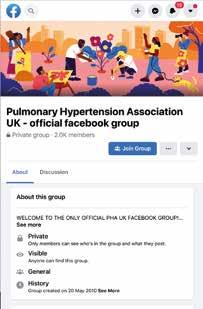

This is our original forum, which now has almost 2500 members. It’s a very active group, with responsive members who offer advice and support at all times of the day and night.

www.bit.ly/OfficialPHAUKFacebookGroup
PHA UK Official Carers Group



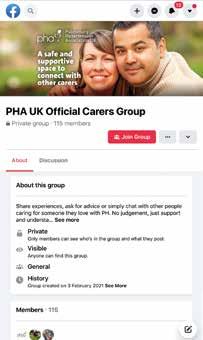
This forum is exclusively for family members, loved ones, and anyone who provides care or support for someone with pulmonary hypertension. Set up in 2021, it is growing to become a valuable source of connection.
www.bit.ly/PHAUKCarersGroup
PHighting On: Life after loss to PH
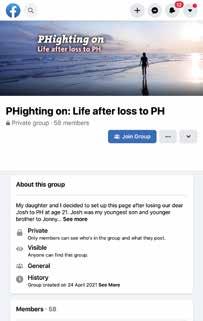


This group was set up by PHA UK members with our support. It is a safe space for families and friends to support each other, share their experiences, feelings and memories – and connect with others that have experienced loss due to PH.
www.bit.ly/PHightingOn_LifeAfterLossToPH PH

Parents UK This has been set up independently of the PHA UK and is run by a group of parents. You can join www.bit.ly/PHParentsUKat
need to have a Facebook profile in order to join these groups. Sign up at www.facebook.com It’s free and easy!
You
Menopause matters, and we know that many women in our PH community are experiencing this time of life. That’s why we’ve produced this new publication to answer common questions, share real experiences, and bring you expert advice - specifically for people with PH - to help make things a little easier.






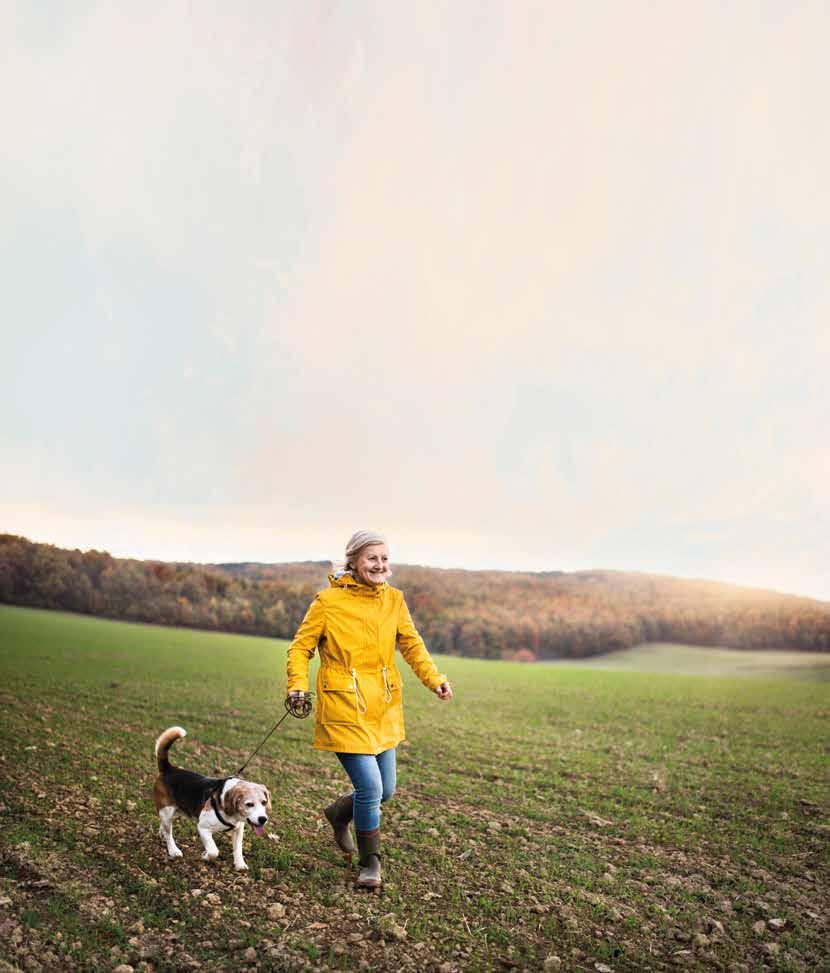
Order your copy for free at www.bit.ly/MenopauseAndPH or scan this code with your phone
“Menopause is an important part of a woman’s life and it’s vital that we recognise the impact it can have.”
Sian Richardson
Help Information Support Advice Contacts Produced by the PHA UK Information to help people with PH who are experiencing perimenopause or menopause MENOPAUSE Help
with PH NEW AUTUMN 2023 emphasis 57
PHA UK Support Nurse
to navigate menopause
Advancing rare disease research and improving patient outcomes


























Supported by a grant from the PHA UK, Dr Emilia Swietlik of the University of Cambridge has been leading a national research study on genetic research in PAH, with the aim of understanding what patients and caregivers expect from these types of studies. In the first of a new series for Emphasis, here she explains more.
Iwas struck by the story shared in the last issue of this magazine of Tom Packham, who experienced a delayed diagnosis for over a year. Tom's experience is not unique and reflects the challenges faced by many patients with pulmonary arterial hypertension (PAH).
Diagnosing rare diseases like PAH is crucial but often proves difficult. There are thousands of rare diseases affecting millions of people worldwide. Patients with these conditions often endure long and complex journeys to obtain a diagnosis, seeing multiple specialists over several years.
This delay can lead to worsening health and reduced quality of life, and finding ways to shorten the time between symptoms starting and diagnosis is vital for the wellbeing of patients, their
families, and society at large.
Important research has been taking place with this aim. An example of this is the National Institute for Health Research BioResource Rare Diseases study (NBR) which aimed to identify the genetic causes of rare diseases through advanced techniques.
The study involved participants from various disease areas, including idiopathic and heritable PAH, pulmonary veno-occlusive disease (PVOD), and pulmonary capillary hemangiomatosis (PCH).









Both adults and children were included in the study and detailed clinical information was collected during the initial diagnosis. Positive results have been returned to patients by their clinical teams.
The National Cohort Study of Idiopathic





























and Heritable Pulmonary Arterial Hypertension is another example.
This study collected routine care follow-up information and included both new and existing idiopathic and heritable PAH, PVOD and PCH cases.

Participants in the study consented to undergo whole genome sequencing (genomic mapping, also known as WGS) and other related studies, and healthy individuals and relatives of affected patients were also recruited. Although some findings from this study have already been published, no results have been communicated back to the patients.
As a result of these studies, new genetic variants associated with the disease have been discovered, providing valuable insights. Crucially, these studies resulted in 25% of patients discovering their form of PAH was genetic rather than idiopathic. They also enabled clinicians and researchers to collaborate around the world, promoting the exchange of knowledge and expertise.
Despite these significant achievements, the translation of genetic discoveries into targeted treatments has been slow. On average, it takes 17 years
AUTUMN 2023 emphasis 58
Research spotlight
for new scientific discoveries to become standard clinical practice. This delay presents a big challenge, especially for patients with rare diseases.
Bridging the gap between research into genes and implementing the findings into healthcare is complex, and advanced research methods can help by assessing the impact of specific genetic factors on how diseases present themselves.

The success of these studies depends on the active involvement and long-term commitment of patients and their relatives, which is why getting involved in research - if you feel able to - is so important.
Understanding the knowledge and attitudes of patients, relatives, carers and clinicians towards genetic research is vital for developing effective studies. However, limited studies have addressed these factors in relation to specific diseases.
By getting patients involved in discussions about their reasons for participating in genetic research, we can gain valuable insights.
With the increasing availability of genomic mapping across different stages of life, it is important to ensure that participants and the public are well-informed and central to decision-making processes.
Whole genome sequencing (genomic mapping, also known as WGS) looks at your ‘genome’, which is your full set of genetic ‘code’ or instructions. This is different to genetic testing done in the NHS, which looks for mutations in a predefined gene panel.









The use of WGS also raises questions about what’s known as ‘informed consent’, particularly for people who are unable to provide it themselves. New approaches like ‘dynamic consent’ are promising as they may enable more
people to get involved in studies.

Informed consent is a process where individuals are fully informed about the nature, scope, risks, and potential benefits of a research study before voluntarily deciding to participate. Dynamic consent is an informed consent model which enables research participants to revise and change their choices regarding their participation in research over time.
The perspectives of patients, relatives, carers, and clinicians regarding the consent process in the context of rare diseases hasn’t been investigated much, but closing this knowledge gap is crucial for shaping effective healthcare policies and practices. [See page 12 for the results of recent PHA UK research in this area].
To address these concerns, here at the University of Cambridge we conducted interviews with people who participated in the NBR and PAH Cohort studies mentioned earlier in this article. The PHA UK helped us to recruit people willing to take part in this research and you may remember seeing opportunities to get involved being advertised by them.

Our aim was to understand their diagnostic journeys, the impact of their diagnosis on their lives, their motivations for participating in research, and any barriers they came up against. By gaining insights into their experiences, we can identify areas of improvement in genetic studies and help make it easier for people to participate in future research.
The people who took part in these interviews have provided us with a wealth of data, which we are currently analysing. We express our heartfelt gratitude to all the participants who generously shared their stories and insights.
It is through their contributions that we can advance our understanding of rare diseases and work towards improving the lives of patients and their families. Look out for more updates in future issues of this magazine!
You’ll find a glossary of terms relating to genetic research on our website at www.bit.ly/Glossary_Terms







































You can scan this code to go straight there!




 Dr Emilia Swietlik
Dr Emilia Swietlik
AUTUMN 2023 emphasis 59
Support at the end of an email
We understand that not everyone is comfortable with using the phone, or there may be a physical or mental impairment which makes talking in this way a challenge. That’s why we wanted to provide a service that’s as valuable as a helpline, but delivered via email instead.

Contact us at support@phauk.org at any time and we’ll get back to you within two working days.
We can help with ongoing emails to support you through a difficult time, or with one-off enquiries or problem-solving. We can also signpost you to other services if needed. Our e-support service is here for whatever you need, in a way that works for you. You’re not on your own.
Please note: We are not trained counsellors, and we cannot assist with individual medical advice. Your specialist PH team should always be your point of contact for queries of this nature. For anything else, we will always do our very best to help youand if we don’t know the answer, we’ll try and find out! Our aim is to get back to you as quickly as possible, but please be patient during busy periods.

“What a brilliant initiative, absolutely fantastic, my thanks and full appreciation to all involved in setting this up” E-support service user
“I'm so grateful to have this chance to email as I'm hearing impaired” E-support service user
Contactus at anytime • C sutcatno ta emityna • support@phauk.org
Getting back to my ‘happy place’ in the water back to my
Before going onto intravenous medication, PHA UK member

Katie Eaton would swim three times a week – and having missed it for years, she has now invested in a drysuit to help her get back to doing what she loves.
Katie, who was diagnosed with PH in 2008, admits it was a big decision due to the hefty £400 price tag. But it all felt worth it when she was able to enjoy the water with her family during their summer holiday in Scotland.

She shared her joy via this Instagram update, posted during her break on the Isle of Skye:

@busterkeaton85 First swim in about 4 years, with my health issues before the pump and the dreaded covid of course!
I have to admit I was really apprehensive. I was worried about the suit leaking and my pump and line getting wet, I even thought I might drown…
I was also pretty embarrassed about wearing a suit, and I suppose that’s why it’s taken me so long to bite the bullet and buy one. I’ve always been the one that’s jumped in the lakes and the sea. Growing up with a dad who is a keen diver, it was just the done thing! Water has always been my happy place.

@hammond_drysuit were amazing. I cried on the phone because I just do when talking about swimming, it was my thing! I spoke to Natasha who was absolutely lovely and didn’t make me feel stupid at all for getting so upset They even rushed the suit through for me in about 2 weeks because I was going away.
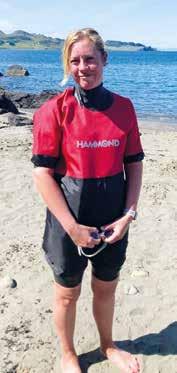
The swimming experience was ace, I still wish I could feel the water on my skin and I’m super buoyant which does make it a lot harder to swim, even when I have tried to squeeze the air out of the suit. Maybe the cold and the waves didn’t help
Long story short, it was still fab and I’m glad I can at least try.

Katie bought her suit from Hammond Drysuits www.hammond-drysuits.co.uk AUTUMN 2023 emphasis 61
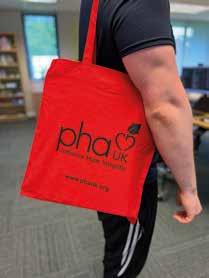
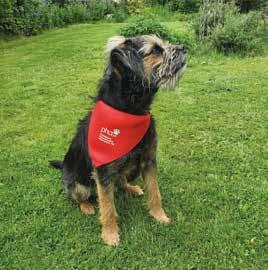


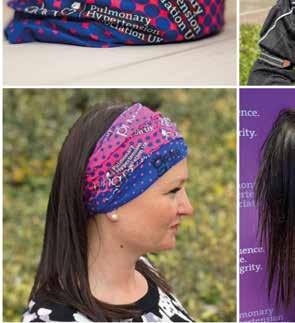
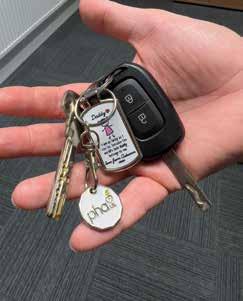
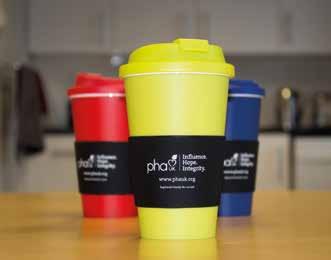


20% OFF AUTUMN 2023 emphasis 62 Grab a bargain at phauk.org/shop SCAN THIS CODE TO SHOP all PHA UK merchandise
Your chance to help yourself and others
If you struggle with low mood or depression, this research opportunity is for you.
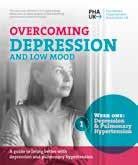



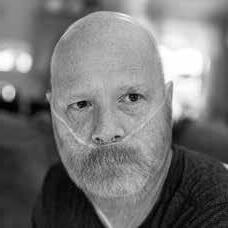
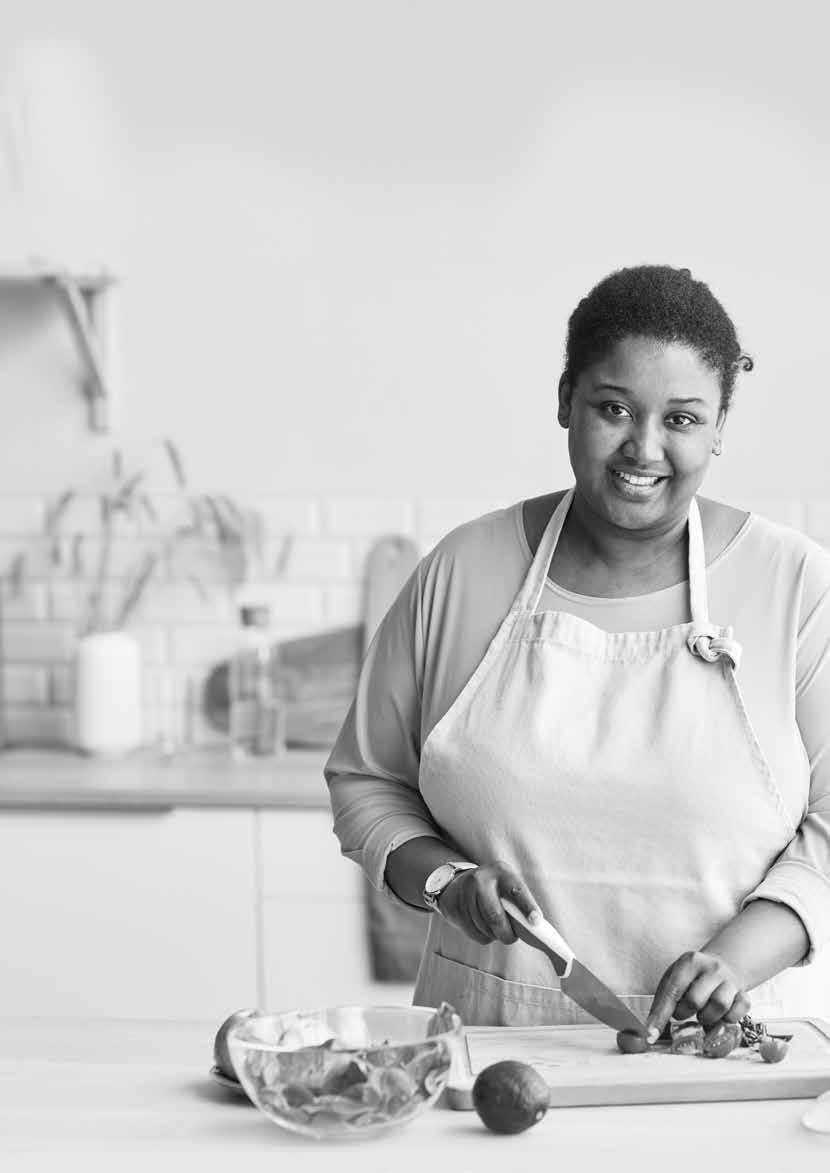
Here at the PHA UK we’ve partnered with clinical psychologists to trial a new self-help programme aimed at supporting people with pulmonary hypertension to manage their depression.
We’re looking for adults with PH who feel they have low mood or depression to take part in this pioneering study to test the effectiveness of a series of self-help booklets, based on cognitive behavioural therapy (CBT).
The programme will then be made available to everyone with PH, so this is a chance to help both yourself and others.

Find out more or apply to take part at www.bit.ly/SelfHelpStudy or scan this code with your mobile phone.


RESEARCH OPPORTUNITY AUTUMN 2023 emphasis 63








PHA UK Christmas cards are back! Five designsfabulousto choose from! £5 per pack FREE P&P Order now at www.phauk.org/shop or scan this code with your mobile phone 30% from each pack sold goes to the PHA UK Spread some festive cheer whilst supporting our charity 10CARDS PER P KCA AUTUMN 2023 emphasis 64
Declaring your health condition to the DVLA

With pulmonary hypertension now a ‘declarable condition’, we know that it can be worrying when you tell the DVLA about your diagnosis. But in most cases, you can continue to drive - even while your case is assessed - as the PHA UK’s Shaun Clayton explains…
We've had many calls into the office over the past few months from people wanting to double check a number of things about the DVLA process. So, I wanted to pen an update about what they're wanting to find out, how long the process can take, and importantly, when you can and cannot drive.
The initial process is still quite similar to what it was a few years ago, when we found out that those who have a diagnosis of PAH or CTEPH, and are under the care of a specialist centre, need to notify the DVLA of their condition. The only change has been that there is now a bespoke form (called PAH1) to declare this. This form was developed by the DVLA with the help of ourselves and the PH community.
When you're completing this form, it is important to consider that the questions being asked are based upon how you are whilst driving, not at any other time of the day.
So, if it was to ask whether you have periods of dizziness, it is related to dizziness whilst driving – not, for example, if you had just hung out the washing or completed a walk test at clinic. The form is designed to capture whether you are safe to drive.
Once you have completed your PAH1 form, be sure to send it to the address specified – but, unless asked, do not send your driving licence along
with it. As you're about to read, you can be in for a long wait, and you may need it whilst waiting.

After sending the form the waiting game comes in. Anecdotally, I have been told that some people are still waiting for a response nine months after sending their original paper through.
Numerous reasons have been given for the delays, ranging from a COVID-19 backlog to awaiting letters from healthcare professionals. Whilst this time can feel like you're in purgatory, not knowing which side the coin is going to land on, the information we have shows that an incredibly high proportion of people keep their licence.

Most keep them on what’s called a ‘three-year medical review’, meaning the licence will be reviewed again in three years. If this is you, please don't despair as the vast majority of people with conditions similar to PH are placed on these licenses due to the unpredictable nature of the disease. Please seek comfort in this being the norm.
This brings me onto the most important part of my piece, what to do whilst you're waiting. Well, first and foremost... unless you have been told otherwise by a medical professional, you can still drive!
If you are just waiting to hear from the DVLA then you are perfectly fine to drive as normal. The DVLA adopt an

'innocent until found guilty' approach to their reviews. When we spoke to them, they said they "only want to take drivers off the road who could pose a danger to others. We don't want to take licenses"
It doesn't matter how long it takes for you to hear back from the DVLA whilst they are reviewing your case; in most instances you are fully entitled to drive.
TOP TIP...
Whilst going through the process, you should be given the option to provide an email and telephone number. Make sure you provide these, as it means you should get emails and texts to keep you updated on the progress of your case.
Driving with pulmonary hypertension
Want to know more?
can order our free leaflet at www.bit.ly/DrivingWithPH
You
AUTUMN 2023 emphasis 65
A guide to notifying the DVLA of your health condition
Alibraryof support
We work with trusted experts to produce the content of our publications, which are always developed following evidence of need. That means we identify information gaps by listening to our PH community, particularly our members, and producing titles in response. Before they are published, our books and leaflets undergo a thorough review process.
• First, they are reviewed by an expert in the topic who has been removed from the production, so they act as a ‘fresh pair of expert eyes’.
• The publication is then reviewed by the expert by lived experience – people with PH, and caregivers / loved ones too. We have a dedicated Feedback Forum, made up 150 PHA UK members, and they are invited to formally review each new publication to offer comments and feedback. (See how you can join this on page 32!)
If changes are required following this process, these will be made before the books are then printed and stocked in our online shop. We also supply each specialist centre with copies for their patients.
We are proud to be part of The Patient Information Forum (PIF) – a membership organisation and network for people working in health information and support. We’re dedicated to ensuring the information and resources we produce are trustworthy and of the highest standard, and we’re delighted to say this has earned us a PIF quality mark for the third year running. This quality mark (PIF TICK) is only awarded to organisations who follow high quality standards when producing health information. You can see all the criteria at www.piftick.org.uk.

AUTUMN 2023 emphasis 66
PHA UK publications provide important advice on all aspects of life with pulmonary hypertension. And best of all, they’re free!
"PHA UK has been committed to producing high-quality health information for many years and it has been great having them as part of the PIF TICK scheme since 2021."
Dan Willis, PIF TICK manager, The Patient Information Forum



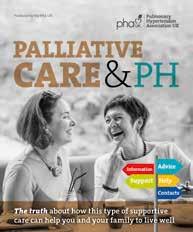
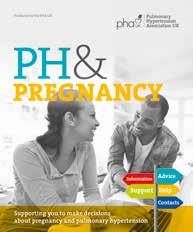
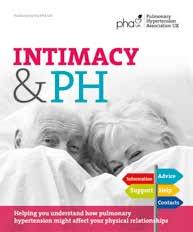



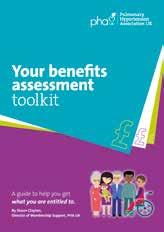
Browse the full range and order your titles at www.bit.ly/PHAUK_Publications or scan this code with your phone. AUTUMN 2023 emphasis 67 These are just some of the titles available… MEDICATION & PH A guide to treating and managing pulmonary hypertension Edited by Dr. Neil Hamilton and Dr. Iain Armstrong Driving with pulmonary hypertension A guide to notifying the DVLA of your health condition YourPocket GuidetoPH
Understanding more about the right heart catheterisation test
The right heart catheterisation (also referred to as RHC, or cardiac catheterisation) is known as the ‘gold standard’ test to diagnose pulmonary hypertension. It can also be used as part of ongoing care, to help doctors make decisions about treatments. In this feature, we answer some common questions about the procedure.

AUTUMN 2023 emphasis 68
What is a right heart catheterisation?
The RHC is a procedure where a small tube (catheter) is passed into a vein and guided around your body to take measurements in the heart and lungs. It is the most accurate way to measure the blood pressure in your heart and the blood vessels in your lungs (the pulmonary arteries).
How is it performed and what measurements are taken?


The procedure is usually performed by a cardiologist (heart specialist) or a respiratory physician (lung specialist) and is done in the hospital.

The procedure is usually performed in a specially equipped room in the hospital called the cardiac catheterisation laboratory (sometimes called the cath lab for short). Exactly where it is will depend on the hospital and your specialist team will be able to tell you more.
During the procedure, the doctor uses local anaesthetic and inserts a very thin, flexible tube (catheter) into a vein in your body and guides it to your heart. The pressure inside the chambers of your heart and the blood vessels in your lungs is measured, along with the oxygen levels in the blood. The procedure also works out how much blood the heart is pumping.
What actually happens during the test?
Before going to the cath lab a doctor will talk to you about the procedure and also discuss these risks with you before the RHC. They will answer your questions and provide any further information if needed to be sure you understand everything. You will then be asked to sign a consent form.

You will be given a hospital gown to change into and then you will be taken to the cath lab. Once there, you will be transferred to a special table that x-rays can be taken through. You will need to lay fairly flat throughout the procedure. Let the team know beforehand if you have back or breathing problems that may make this difficult for you. You need to be awake during the procedure so that you can follow instructions so you may not be given sedative medication before the RHC.
A doctor or staff member will prepare an entry point for the catheter, usually at the neck or upper thigh (groin). The area will be cleaned, possibly shaved, and then numbed with local anaesthetic. You should not experience much discomfort apart from the initial sting of the local anaesthetic injection. If you do experience any discomfort or there is anything that is worrying you about the test you should let the team know straight away so that they can help.
Once the local anaesthetic has been applied, the doctor makes an opening in the vein and threads in a long, thin, flexible tube, called a catheter into the vein. They then direct the catheter along the vein, through the heart and into the blood vessels in the lungs. An x-ray machine and other equipment is used to monitor the position of the catheter. The catheter is used to measure the pressure in the heart and in the blood vessels in the lung. They also record how much oxygen is in your blood and the amount of blood your heart is pumping each minute.
Something known as a 'vasodilator challenge' may be done during RHC. This can help guide your treatment. It involves giving a short-acting medication (often something that can be breathed in from a mask) to see if the pressurein your lungs falls in response to
that particular medication. A ‘fluid challenge’ might be given at the time of RHC. This is to see how the heart copes with a little extra fluid and can help work out why the pressure is high in the lungs.
You may be asked to undertake some form of exercise during the RHC. This is to see how the heart and the pressure responds to working a bit harder than when resting. It may involve turning the pedals of a special exercise bike during the test and can give a bit more information about how the heart and lungs work together.
Once all the measurements have been completed, the catheter is carefully removed, and the doctor will apply pressure to the small puncture site to prevent bleeding. After this, a dressing is placed over the entry site, and you will be taken to a recovery room.
How long does it take?
The RHC usually takes less than an hour. Most people can go home the same day but it’s possible (although rare) that you may need to stay in the hospital overnight. It is generally recommended that you don’t drive home after the test if possible. You can be tired and rarely a bit sore for the evening after the procedure so having someone to drive you home, or other transport, would be preferred.
AUTUMN 2023 emphasis 69 You’ll
www.bit.ly/RHCatheter The content is also available to order as a printed leaflet at www.bit.ly/RHCleaflet Scan this code to watch a guide to understanding this test, filmed with PH consultant Having a right heart catheterisation Information for patients
find more information about the procedure on our website at




Join FREE today www.phauk.org 0300 373 5367 office@phauk.org Be part of a 4,500 -strong national support network We’re here to support people like you. Join today and benefit from: • Support and advice • Helpful printed information & resources • Emphasis magazine delivered to your door • Free access to financial advice from qualified professionals via our partnership with Turn2Us • Fundraising ideas and guidance Being part of the PHA UK also enables you to participate in important research, and our friendly office staff are just one call away when you need advice. Join our PH family and you’ll be joining 4,500 members in a unique network of support and inspiration. Stronger together Share this magazine with family & friends
Andfinally... Get involved with Emphasis! This is your magazine
Share your PH story
Tell our readers about any aspect of your journey with PH. We like to include experiences from both loved ones and carers.
Tell us your tips
Found something that makes life with PH a little bit easier? Contact us with your recommendations, findings, and nuggets of advice, so we can share them with others via these pages.

Submit a letter
Want to comment on something you’ve seen in Emphasis, or share an opinion or feedback for print? Write us a letter or send us an email – you’ll find the addresses at the bottom of the page.

Send us your poems, pictures or photographs
We love to celebrate the talents and achievements of our readers. Send us something that has made you smile, something you’re proud of, or something you want to share with others. This is a great way for children to get involved and see themselves or their work in print too.
Pass on a feature idea
If you’d like to see a topic covered in this magazine, or you have an idea for an interview, send us your suggestions.
Get in touch!
Contact us here at Emphasis by emailing media@phauk.org or writing to Emphasis, PHA
Don’t forget to tell us if you’rehouse!moving
December
Your next issue will arrive in
AUTUMN 2023 emphasis 71
UK Resource Centre, Unit 1, Newton Chambers Road, Thorncliffe Park, Chapeltown, Sheffield S35 2PH
















































 Lynsey Francis
Lynsey Francis








































































































































































































